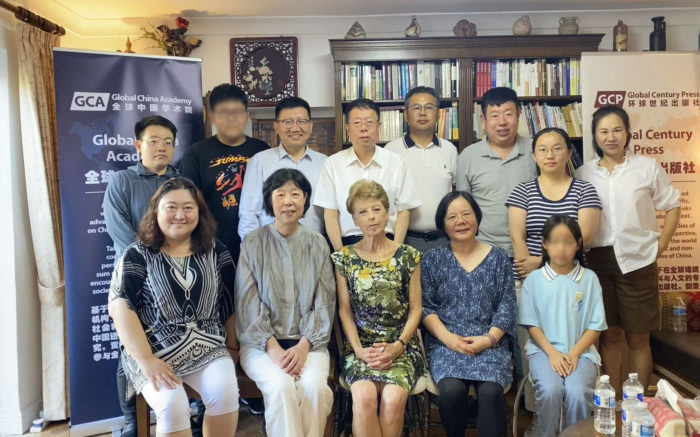
GCA Life Fellow Professor ZHU Guanglei and His Family’s Visit to the UK (2-11 August 2024)
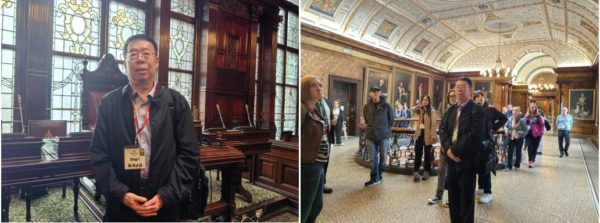
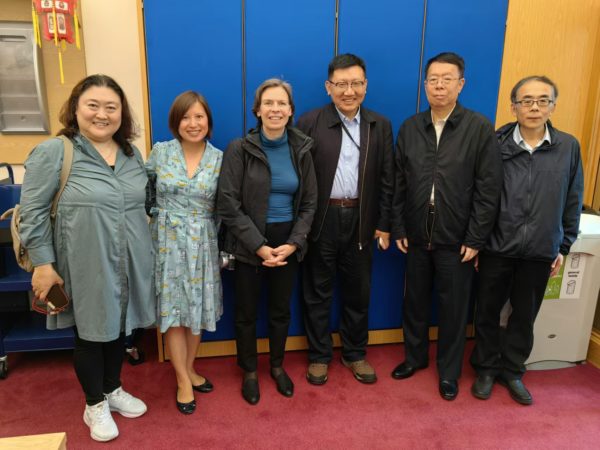
Around 7 pm. on August 8, I visited the hotel where Professor Zhu and his family were staying in Willesden Green to welcome them. Thanks to Professor Zhu’s thoughtfulness, the postcode is NW2, just a 20-minute drive from the GCA Fellows’ Home (NW7). In a city as vast as London, you could almost call us neighbours! Inspired by the traditional Chinese intellectual ideal of ‘reading ten thousand books and traveling ten thousand miles,’ I added two more phrases: ‘dining on international cuisine and making friends from all corners of the world.’ I chose a nearby Turkish restaurant, Lezziz Charcoal Grill, to host them. The restaurant has a simple yet warm decor and offers authentic Turkish kebabs and a variety of Mediterranean dishes. The top left photo shows our ‘big family photo’ (from left to right): Professor Zhu’s son, daughter-in-law, wife, granddaughter, Professor Zhu himself, and me. After enjoying a rich Mediterranean salad, the barbecue feast that followed was about twice the size of what’s shown in the bottom left photo, and the desserts and tea that came afterward were also quite special.
During the meal, we discussed the differences between Chinese and Turkish cuisine, from their forms to their content, and appreciated their attitude of ‘admiring the beauty of others’ and ‘harmony in diversity’ (Fei Xiaotong’s term). Professor Zhu mentioned that restaurants in the UK are livelier than those in China. However, on the way back after dinner, I noticed that quite a few restaurants were rather quiet, which suggests that my choice was not bad, and everyone seemed quite satisfied. I believe that time abroad is precious, and aside from clothing, the experiences of food, accommodation, and travel should all differ from those in our home country.

From August 9 to 10, accompanied by friends and the Academy’s Operations Manager, David Liu, Professor Zhu and his family visited various attractions in London and the surrounding areas.
On the afternoon of the 10th, Professor Zhu and his family came to GCA Fellows’ Home, where they received a warm welcome. The following photos, from left to right and top to bottom, show: me giving a brief introduction to the day’s activities; Professor Zhu presenting a gift to the Academy. He explained that it is a ‘Lotus and Surplus’ New Year painting from Yangliuqing, Tianjin [Note 2], and he wished it would bring good fortune to the Global China Academy. Following this, Professor ZHAO Kejin presented small gifts to both me and Ingrid Cranfield, the former chair of the Academy’s Board of Trustees and the president of Global Century Press.
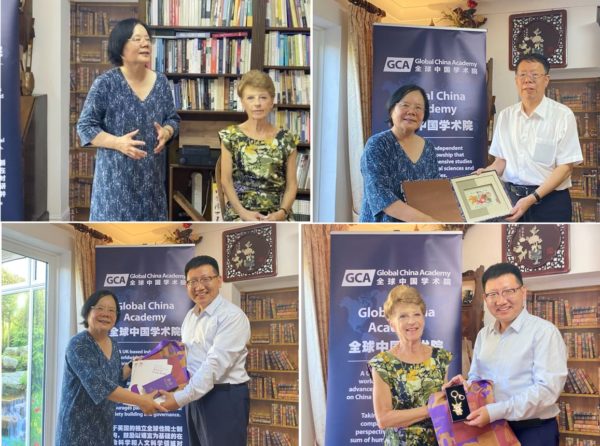
The following is an expanded ‘big family photo,’ which includes three generations of Professor Zhu’s family (five members) and a friend, Professor Zhao’s family of three, and four staff members from the Academy. In addition to Ingrid and me, the photo also includes Operations Manager David Liu (fourth from the right in the back row) and Project Manager Li Yu (first on the right in the back row). I appreciate both of them for driving and accompanying the two families on visits to Oxford and other places respectively.
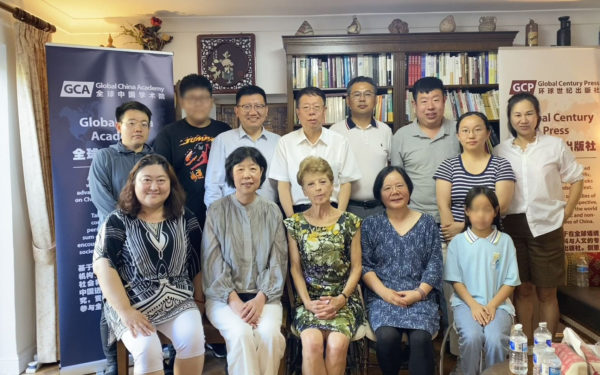
Next is free discussion time (see photos below).

The dinner was a Western-style meal, held in two separate dining rooms: 10 people in the main dining room, and Professor Zhu’s son and his family of three in the garden dining room (as shown in the top left and right of the photos below). It was only afterward that we realized the three courses represented a combination of Italian, French, and British flavors.
- The starter consisted of two parts: one part was a Mediterranean-style seasoned avocado, where the avocado was halved and pitted, then drizzled with balsamic vinegar and olive oil, and sprinkled with black pepper. This dish highlighted the creamy texture of the avocado and its subtle nutty flavour, while the tanginess of the balsamic vinegar and the fruitiness of the olive oil added layers of complexity. The other part of the starter was a beetroot salad with basil and cashews, made with beets handpicked from a nearby farm, boiled, and then mixed with fresh basil leaves and cashews, all tossed in olive oil to create a refreshing salad with a hint of nutty flavour.
- The main course: Since Professor Zhu mentioned he wanted to have grilled fish, we prepared gratinéed salmon with samphire, buttered potatoes, and purple sprouting broccoli. This dish incorporated many classic elements of French cuisine and can thus be classified as a French-inspired dish.
- Dessert: Apple and blackberry pie with cream, all homemade by Ingrid. This is a classic British dessert, combining the sweetness of apples with the slight tartness of blackberries. The pie had a crispy crust and a juicy filling, complemented by smooth, rich homemade white cream. The white of the cream contrasted beautifully with the golden pie crust and the deep red-purple of the fruit filling, enhancing the overall dining experience. The combination of the creamy milk flavour and the fruity aroma of the pie created a striking taste contrast, offering a very comforting culinary experience. [Note 3]
Most importantly, every apple and blackberry used to make these two pies was handpicked by Ingrid herself. We hope that our Fellows and their families can truly feel at home at the GCA Fellows’ Home and take away fond memories of familial warmth.
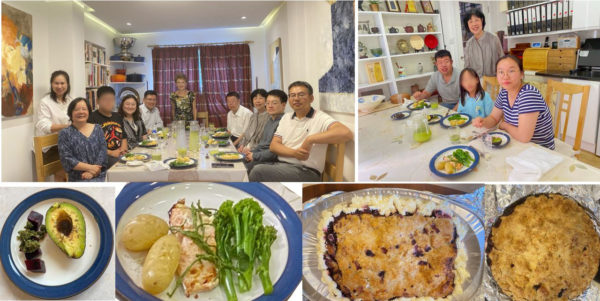
After dinner, having coffee and tea—a dining habit that combines elements of health, tradition, culture, and social interaction—added much enjoyment and benefit to the evening. The following photos show scenes of everyone chatting and drinking from the dining room to the garden, with everyone leaving fully satisfied.
The photo on the bottom right was taken the next morning when I went to Professor Zhu’s residence to bid farewell to his family. When asked if he felt homesick after coming to the UK, he replied, ‘My whole family is here, and we’ve enjoyed the home-like hospitality at the Fellows’ Home, so of course, I’ll miss this home!’ As I watched the minibus take Professor Zhu and his family to the airport, I felt a deep sense of admiration for the seamless coordination among our colleagues and team during this first-time reception of a Fellow and his family at our Fellows’ Home.


- In 2018, during the preparations for the Fifth Global China Dialogue: Global Governance for Justice, we invited Professor Zhu Guanglei, Vice President of Nankai University, as the keynote speaker from China. Since he was initially introduced as ‘President Zhu,’ we have continued to use this title thereafter in Chinese version.
- This is a New Year painting from Yangliuqing, Tianjin, a famous form of Chinese folk art that originated in the Ming Dynasty. The lotus in the painting symbolizes purity and nobility, the child represents innocence and hope, and the carp signifies good fortune and abundance. The painting is titled ‘Lotus Year with Surplus,’ which is a play on words, as the phrase sounds like ‘abundance year after year’ in Chinese.
- The detailed description of the dinner here might be unnecessary for English readers. However, the following examples encouraged me to write freely on the blog.
- I recall our English editor suggested cutting out the part about ordering and discussing the meal at ‘The Real Greek’ restaurant in the blog post on ‘Global China Academy’s Two-Day Team Building: Integrating Academic Insights with Cultural, Historical, and Natural Exploration,’ because it might seem “boring” to British readers.
- This reminded me of a book published by Global Century Press titled Cultural Gap—Notes of a British Broadcaster Growing Up in China, written by Paul Crook and published in 2017. It’s a Chinese book, and he believed it shouldn’t be translated into English because it would likely seem “boring” to British readers. I accepted his judgment, as he grew up in a bilingual environment of both English and Chinese. Paul’s father, David Crook (1910-2000), was a British communist, writer, and teacher, and his mother, Isabel Crook (1915-2023), was a British-Canadian social anthropologist, professor, and educator. They co-authored several books, including Revolution in a Chinese Village, Ten Mile Inn (1959) and Ten Mile Inn: Mass Movement in a Chinese Village (New York: Pantheon Books, 1979). Since 1949, they had been teaching English at Beijing Foreign Studies University.
- Another example is when our graphic designer added a note in the ‘GCP style rules for rendering Chinese-English dual languages’ (3.1.2 GCP style rules for rendering Chinese-English dual languages) section of the Global Century Press House Style Guide: ‘Note for English-language readers: The following two sections (3.1.2 and 3.1.3) are not relevant. They contain information mostly relating to the typesetting of GCP’s overseas Chinese editions – the transcultural process of combining English and Chinese typesetting styles for overseas Chinese readers.’ (p. 26). I borrowed this note as an explanation for all my blog readers, whether they are English or Chinese speakers.
Chang Xiangqun, August 22, 2024

全球中国学术院终身院士朱光磊教授携全家访问英国(2024年8月2日至11日)
继2023年全球中国学术院中心实施“改革开放政策”的第一年之后,2024年8月2日至11日,全球中国学术院终身院士、南开大学前副校长朱光磊教授访问了英国。这是学术院首次接待来自中国的院士,我们期望通过与朱光磊教授的进一步交流,扩大与中国及相关学术界的联系和影响,同时宣传“院士之家”对院士及其家属的温馨接待,树立全球院士接待的典范。虽然朱教授的行程短暂,但整个过程值得在此分享,以供全球各地的学术院院士及相关单位参考。
1. 邀请安排
2024年6月初,朱光磊教授与我联系,表示他将在暑假期间访问英国。经过与负责院士工作的副院长彼得·施罗德(Peter Schröder)教授的沟通,我们联名为朱校长【注释1】签发了邀请函。邀请函中明确说明,作为学术院的院士,他本人和家人均可在我们的“院士之家”免费住宿一周(详见院士待遇第12项,此外还包括其他多项待遇)。朱校长表示,希望通过访问英国及与学术院的互动来扩大学术影响。同时,他也愿意顺便做学术讲座,并提供了两个讲稿:一个是“政府职能转变的过程与逻辑”,另一个是“现阶段中国阶层格局变化的十大新特点”。由于此次行程还包括与格拉斯哥大学的深度交流,他将先前往格拉斯哥,再到伦敦。他对学术院表示感谢,但已预订了旅店,因此,不会在学术院的“院士之家”住宿。对此,我们感到非常遗憾,并希望以此为契机,广泛宣传学术院的院士待遇。这样,未来院士及其家人到伦敦时,就可以避免像朱校长及其家人这样在食宿和交通等方面的额外支出。
2. 格拉斯哥活动
根据朱校长的行程安排,他们于8月2日至7日在格拉斯哥的活动由格拉斯哥大学社会与政治科学学院政治系苏格兰中国研究中心主任杜珍(Jane Duckett)教授负责接待与安排。在此,仅分享其中两例。
以下照片展示了朱校长参观格拉斯哥市政厅的情景。左边的照片是在一个会议室或议事厅,华丽的木质装饰风格体现了维多利亚时期对细节的关注,雕刻精美,代表了当时的建筑风格和工艺水平。彩绘玻璃窗是格拉斯哥市政厅内部的一大特色,这些玻璃描绘了象征性图案或城市徽章,展示了格拉斯哥的历史和文化。右边的照片中,天花板上的雕刻和绘画十分精美,许多地方使用了大理石和金箔装饰,展现出当时市政府的权威和富裕;大型的历史油画以及复杂的铁艺栏杆,这些元素体现了市政厅作为城市权力象征的重要性。市政厅作为城市的象征,反映了格拉斯哥在不同时期的历史文化发展和社会变迁。

由于朱校长访问韩国的原因,他到英国度假的日期推迟到了八月初。与清华大学社会科学学院副院长赵可金教授访问格拉斯哥的时间有所重叠。在朱校长的帮助与协调下,促成了杜珍教授与赵可金教授的会谈。以下照片从左至右依次为:赵可金教授的爱人、格拉斯哥大学孔子学院外方院长龙多、杜珍教授、赵可金教授、朱光磊校长及孔院中方院长、南开大学经济学教授周申。之后,他们与孔院的老师们一起参观了校园。

3. 伦敦市区及周边的活动
8月8日晚上7点多,我来到位于Willesden Green的朱校长下榻的旅店,欢迎他们全家。感谢朱校长的体贴,这里的邮编是NW2,与学术院的院士之家(NW7)只有不到20分钟的车程,在偌大的伦敦几乎可以说是近邻了!基于中国知识分子传统的“破万卷书、行万里路”理念,我们加了两句“食国际餐、交四方友”,并选择了他们驻地附近的一家土耳其餐馆来接待他们。这家Lezziz Charcoal Grill餐馆内部装饰简约,但氛围温馨,提供正宗的土耳其烤肉和丰富的地中海美食。以下照片左上为我们的“大家庭照”(自左至右):朱校长的儿子、儿媳、夫人、孙女、他本人和我;在享用完丰富的地中海沙拉后,上来的烧烤大餐相当于左下图中的两倍,之后的甜食和茶也都挺别致。席间,我们讨论了中餐与土耳其餐从形式到内容的区别,欣赏对他们这种“美人之美”和“美美与共”的态度。朱校长说,英国的餐厅比国内的热闹,餐后回来的路上,我注意到不少餐厅也挺冷清的,说明我的选择还不错,大家也挺满意。我认为,出国时间宝贵,穿衣除外,食住行都应该是与在国内不同的体验。

8月9日至10日,朱校长一家在朋友和学术院后勤经理刘大卫的陪同下,分别参观了伦敦及周边的景点。
10日下午,朱校长及全家来到学术院的院士之家,受到了热情的接待。以下照片自左至右、自上而下分别是:我对当天的活动进行了简单介绍;朱校长向学术院赠送了礼品。他表示,这是天津杨柳青的“莲年有余”年画【注释2】,愿它为全球中国学术院带来美好的祝愿。接着,赵可金教授分别向我和学术院信托会前主席、环球世纪出版社社长Ingrid Cranfield 赠送了小礼品。

以下这张是扩大的“大家庭照”,包括朱校长一家三代五口及一位朋友、赵老师一家三口、学术院的四位工作人员。除了我和Ingrid之外,还有后勤经理刘大卫(后排右四)和项目经理余莉(后排右一)。感谢他们二人分别驱车陪同两家到牛津等地参观访问。

接下来是自由交流时间(见以下照片)。

晚宴为西餐,分别在两个餐厅举行:10人在主餐厅,朱校长的儿子一家三口在花园房餐厅(见下图上排左右)。事后才意识到,这三道菜是意大利、法国和英国风味的组合。
- 头盘包括两部分:一部分是地中海风格的调味牛油果(Seasoned Avocado),牛油果去核后一分为二,在果肉中淋上意大利香醋、橄榄油,并撒上黑胡椒。这道菜突出牛油果的奶油质感和淡淡的坚果香气,同时意大利香醋的酸味和橄榄油的果香增添了层次感;另一部分是香草腰果甜菜根沙拉(Beetroot Salad with Basil and Cashews),使用了在附近农场自己采摘的甜菜根,煮熟后搭配新鲜的罗勒叶和腰果,再拌上橄榄油,形成一种既清新又带有坚果风味的沙拉。
- 主菜:由于朱校长表示他想吃烤鱼,因此我们准备了烤蛋黄酱三文鱼配海松草、黄油小土豆和紫芥兰(Gratinéed Salmon with Samphire, Buttered Potatoes, and Purple Sprouting Broccoli),这道菜结合了许多法式料理的经典元素,因此可以归类为法式风味的菜肴。
- 甜点:苹果黑莓派(Apple and Blackberry Pie)和奶油,都是Ingrid自制的。这是一道经典的英式甜点,结合了苹果的甜味和黑莓的微酸,外皮酥脆,内馅多汁,再配上绵滑浓郁的自制白色奶油,奶油的洁白与派的金黄、果馅的紫红形成了漂亮的色彩对比,不仅提升了整体的餐桌体验,其乳香与派的果香结合在一起也形成了鲜明的口感对比,营造出非常舒适的味觉享受。【注释3】
最重要的是,制作这两个苹果黑莓派的每一个苹果和每一粒黑莓都是Ingrid亲自采摘的,希望我们的学术院院士和家人在院士之家能够真正体验到家的感觉,并带走亲情般的美好记忆。

晚餐后喝咖啡和茶,这种综合了健康、习惯、文化和社交等多重因素的饮食行为,为晚餐后的时光增添了不少乐趣和益处。以下照片展示了大家一边喝饮料一边聊天的场景,从餐厅一直到花园,最后大家都尽兴而归。
下排右边的照片是第二天早上我到朱校长的住地为他们全家送行。当问及朱校长到英国后是否想家时,他说:“全家都在这里,并且享受到了院士之家的家庭式接待,当然会想这个家啊!”目送着小巴把朱校长全家带往机场,心中对这次我们学术院的同事和团队首次接待学术院院士及其全家的默契配合感到由衷的感佩!


注释:
1. 2018年,在第五届全球中国对话——全球正义治理的筹备期间,我们邀请到的中方主旨发言嘉宾是南开大学副校长朱光磊教授。由于一开始被介绍的是“朱校长”这个称谓,之后我们便沿用了这一称呼。
2. 这是一幅起源于明代的中国著名民间艺术天津杨柳青的年画,画中的莲花象征着纯洁与高尚,儿童象征着纯真与希望,鲤鱼象征着吉祥和丰收。此画名为“莲年有余”,这四个字取其“年年有余”的谐音。
3. 这里详细介绍了晚宴的内容,对英语读者来说可能是多余的。然而,以下几个例子鼓励我在博客中自由写作。
- 记得我们的英文编辑在编辑“全球中国学术院两天团建活动:融合学术洞察与文化、历史及自然探索”的博文时,建议删掉在“真正的希腊”The Real Greek餐厅点餐及相关议论的部分,因为在英国人看来这些内容“枯燥”(boring)。
- 这让我想起了环球世纪出版社出版的一本书《文化鸿沟——中国生长的英国播音主持人手记》,作者是柯鸿冈(Paul Crook),出版于2017年。这是一本中文书,他认为不宜翻译成英文,因为对英国人来说会觉得“枯燥”(boring)。我接受了他的判断,因为他在英语和中文的双重语境中成长。鸿冈的父亲大卫·柯鲁克(David Crook,1910-2000)是英国共产主义者、作家和教师,母亲伊莎白·柯鲁克(Isabel Crook,1915-2023)是英属加拿大籍社会人类学家、教授、教育家。他们合著了《十里店:中国一个村庄的革命》(Revolution in a Chinese Village, Ten Mile Inn, 1959)和《十里店:中国一个村庄的群众运动》(Ten Mile Inn: Mass Movement in a Chinese Village, New York: Pantheon Books, 1979)等书籍。他们从1949年起一直在北京外国语大学教授英语。
- 还有一个例子,就是我们的美编在《环球出版社出版指南与体例》中的“中英双语排版规则”(3.1.2 GCP style rules for rendering Chinese-English dual languages)加了一段话:“给英文读者的注释:以下两节(3.1.2 和 3.1.3)与您无关。它们主要包含有关环球世纪出版社海外中文版本排版的信息,这种将英文和中文排版风格结合起来的跨文化过程是为海外中文读者服务的”(第26页)。我借用这个注释,作为给我所有博文读者的说明,无论是英文还是中文读者。
常向群,2024年8月22日
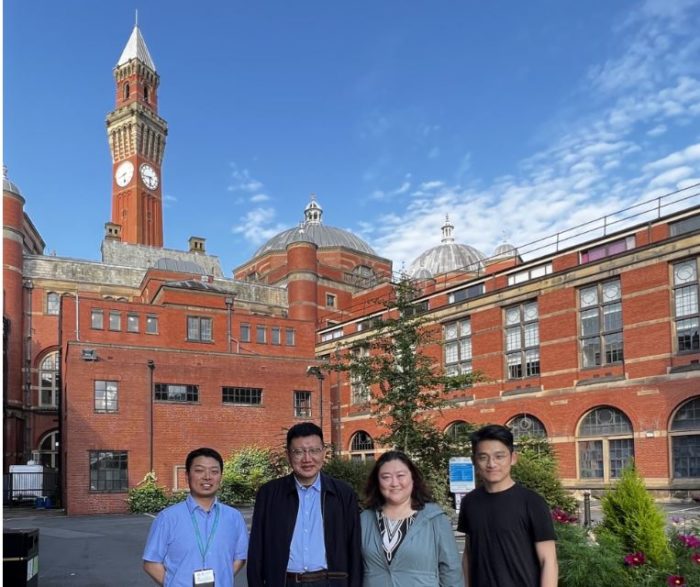
Impressions and Reflections on Visiting Birmingham in the UK
Impressions and Reflections on Birmingham in the UK[1]
July 30-31, 2024
ZHAO Kejin, YUAN Lijuan
On July 30th, after approximately a two-hour journey, departing from the scholarly haven of Oxford, rich with academic atmosphere, we arrived at the birthplace of the Industrial Revolution, Birmingham.! Birmingham, as the industrial hub of central England, is also the second-largest city in the UK after London, and it’s a magical place with many stories!
For many who still perceive the UK through the various news of the British royal family or the Premier League teams, it’s unavoidable to recognize the over 200 years of industrialization that the UK began. This era propelled human technology, wealth, art, and life to a peak period, significantly widening the modern development gap between the East and the West! We can’t help but ask, did all this originate merely from the bubbles rising in Watt’s eyes?
Next to our hotel was the ancient canal path of Birmingham, with many old buildings and facility remnants from its days as a loading and unloading dock still preserved. One can imagine the bustling scenes and the sweaty work environment of the past, as people laboured hard for a better future! In the period around 1776, Britain’s production was still backward, markets were fragmented, and there were some gaps between people and a life of more wealth and freedom! Many people traveled long distances, setting sail across the ocean to seek a free and beautiful world, while those who stayed had to think hard within the existing structure to seek breakthroughs!
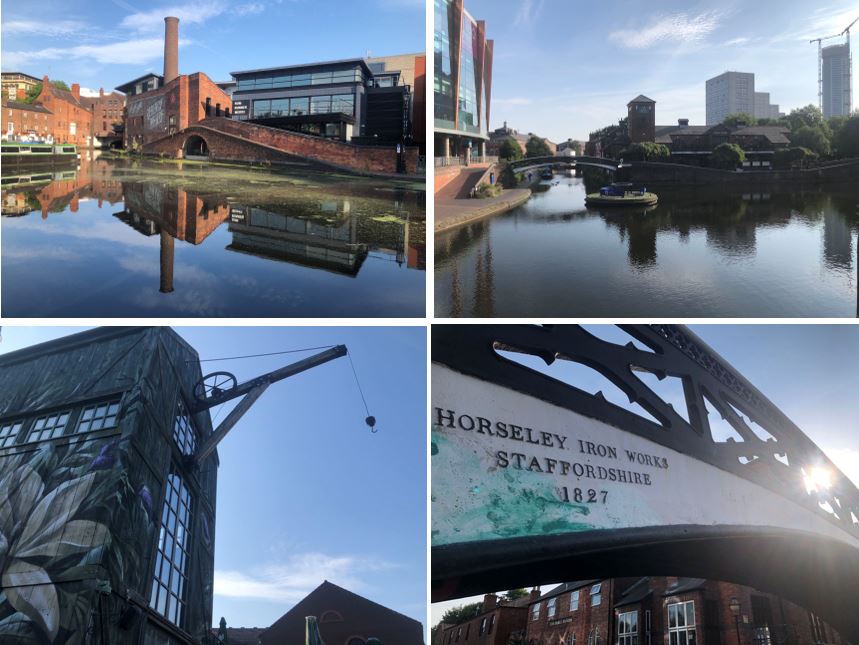
Top Left Photo: This is a view of the canal area in central Birmingham, featuring historical landmarks such as ‘Regency Wharf’ and ‘Rum Runner Works,’ part of the city’s extensive canal network. The photo shows the coexistence of red brick buildings and modern architecture, highlighting the blend of old and new in this area. Top Right Photo: This is Brindley place and its surrounding areas in central Birmingham, known for its beautiful canal scenery, historical buildings, and modern facilities. The modern buildings on the left contrast with the historical buildings on the right, with high-rise buildings and bridges over the canal adding layers to the cityscape, showcasing the city’s diverse development and vibrant urban character. Bottom Left Photo: This is a building in Birmingham’s canal area, with an old crane and pulley system on top, once used for canal cargo loading and unloading, symbolizing the canal trade and industrial activity of the past. The large mural depicting plants on its exterior wall combines industrial, artistic, and historical elements of the canal area. Bottom Right Photo: This is an iron bridge in Birmingham’s canal area, manufactured in 1827 by the Horseley Iron Works in Staffordshire, known for high-quality iron products. The bridge showcases 19th-century industrial technology and design, reflecting the engineering and manufacturing achievements of the British Industrial Revolution.
Birmingham is indeed the birthplace of the Industrial Revolution. However, the secret of British industrialization has not been extended to ecological research. Britain, an island nation surrounded by the sea, relied heavily on maritime transport. However, focusing only on the sea wouldn’t have led to the Industrial Revolution, as seen in Indonesia and India, where no such revolution occurred. The British Industrial Revolution was closely linked to canal digging, similar to China’s Grand Canal and the Red Flag Canal in Linzhou, Henan.
Before the 18th century, Britain had no canal system of its own. The presence of the Pennine and Cambrian Mountains caused rivers like the Thames, Severn, and Trent to flow into the North Sea and the Irish Sea, preventing inland water retention and hindering transportation. Carriage transport was backward. However, as factory handcrafts transformed into machine-driven large-scale industry, with factories emerging in 1721, Watt inventing the steam engine in 1776, trains appearing in 1830, and a nationwide railway network established by 1850, it’s clear that railways were a result, not a driver, of industrialization. Over a century before railways, industrialization accelerated due to the construction of the Bridgewater Canal in 1759.
The digging of canals was spurred by coal and iron ore discoveries in Manchester and Birmingham, with canal transport capacity far exceeding that of carriages. This success prompted British merchants to invest in canal systems. James Brindley planned the Grand Cross Canal, linking Liverpool on the west coast, the Mersey River, and London on the east coast, the Thames River, with the Humber River and Severn River ports. Birmingham, at the intersection of this canal, gained immense industrialization opportunities, poised at this historical crossroads to seize them.
Thus, Birmingham is an industrial city pulled by the Grand Cross Canal, the mother river of British industrialization. This foundation led to the development of the Grand Junction Canal, transforming Britain’s ecological system and setting the stage for industrialization. The engine of the British Empire was ignited, leading the UK into a new era of world history.
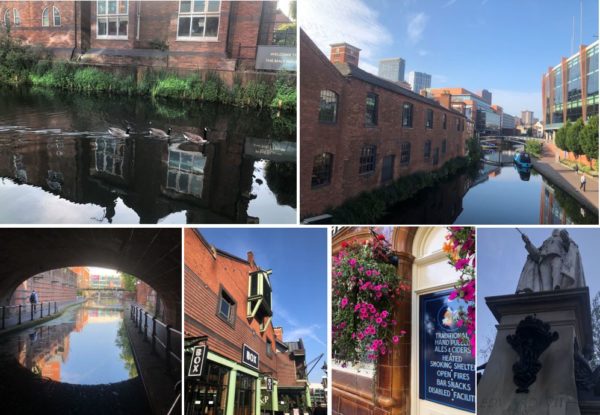
Top Left Photo: This is a serene section of the canal area in Birmingham, with three Canadian geese (Branta canadensis) leisurely swimming. The sign on the building’s lower right corner reads ‘The Malt House,’ a historic restaurant or pub in the canal area, showcasing the perfect blend of nature and man-made structures. Top Right Photo: This is a view of the canal area in central Birmingham, with historic red brick industrial or warehouse buildings on the left, now possibly repurposed for modern use, and modern glass buildings on the right, highlighting the stark contrast between old and new. Bottom Photo 1(from left to right): This is a view from inside a canal tunnel in Birmingham, looking out towards the red brick buildings and the small path along the canal, with bridges and modern buildings in the distance, showcasing the blend of old and new in the canal area. Bottom Photo 2: This is part of the ‘Mailbox’ building in central Birmingham, a landmark combining shopping, dining, hotels, and offices. The photo shows restaurant or bar signs like ‘BOX’ and ‘Pitcher & Piano,’ located within the Mailbox. The architectural style blends modern and traditional elements, reminiscent of commercial areas near Shanghai’s City God Temple, perhaps inspiring modern large shopping and entertainment complexes. Bottom Photo 3: This is the exterior of a traditional pub in Birmingham, with signs by the door listing services such as traditional hand-pulled ales and ciders, heated smoking area, open fire, bar snacks, and disabled facilities, reflecting the traditional décor and typical atmosphere of British pubs. Bottom Photo 4: This is a statue of Edward VII in Victoria Square, Birmingham, with the base inscription explaining his reign as King of the United Kingdom from 1901 to 1910. As the eldest son of Queen Victoria, during his reign, he significantly enhanced Britain’s position on the international stage and its social progress by promoting social reforms and modern diplomatic policies. Victoria Square is also home to many other historical monuments and artworks, as well as important buildings like the Birmingham Town Hall and the Birmingham Museum and Art Gallery.
If James Brindley’s planning of the Grand Cross Canal started the engine that ushered the UK into a new era of world history, then James Watt’s discovery of steam’s industrial value and his invention of the machines to harness that value radically transformed human production and lifestyle. Following Watt, many others pushed these unprecedented discoveries and inventions to new heights.
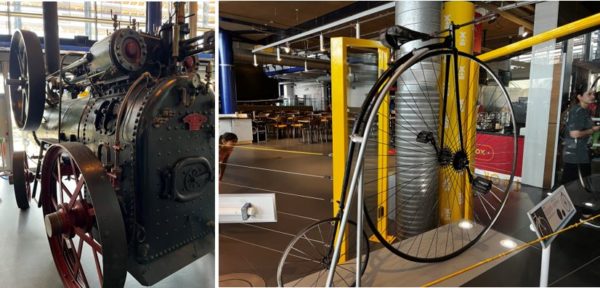
These two photos were taken at Birmingham’s Thinktank Science Museum, located at Millennium Point, an interactive science museum showcasing various exhibits from the Industrial Revolution to modern technology. Left Photo: This is an ancient steam locomotive, demonstrating the complexity and aesthetics of mechanical manufacturing during the Industrial Revolution. The design includes large drive wheels, a complex piping system, and various valves and instruments. Its working principle involves burning coal or wood to heat water, generating steam whose pressure drives pistons, which in turn rotate the wheels, showcasing the engineering achievements and technological progress of the steam power era. Steam locomotives were widely used in industrial and transportation fields in the 19th and early 20th centuries, propelling the progress of the Industrial Revolution. Right Photo: This is a high-wheeled bicycle (Penny-farthing) that was very popular in the late 19th century. The design aimed to increase riding speed since a larger front wheel could cover more distance per rotation. However, due to its instability and tendency to cause falls, it was later replaced by safer and more practical modern bicycles.
Our world is a time-space combination based on energy. With humanity’s current cognitive abilities, we can only perceive and utilize about 5% of time-space energy, with much of the unknown world awaiting our exploration! The exploratory spirit of Watt and his successors, given their limited resources, has already created such a brilliant situation. Imagine the future with countless possibilities, where we seek the value of life in the interplay of the finite and the infinite! What we can see is always just a small part of the totality we possess. Discovery pertains to stock; invention pertains to increment; exploration pertains to infinity. This perhaps embodies the profound and implicit meaning of Chinese words. In the longing for a better life, there is no difference among various races, countries, or civilizations!
During our two-day flying visit in Birmingham, another deeply touching aspect was the presence of a group of people from our homeland, overseas Chinese! For livelihood or studies, they left their homeland, rooted themselves here, and sought development at the intersection of Eastern and Western civilizations, facing imaginable difficulties and challenges! However, they are a wise group, finding suitable living spaces with their strong vitality, integrating into the local energy environment, and becoming one with it! Whether from Darwin’s natural selection or the Chinese saying that ‘a tree thrives by moving, and a person thrives by relocating,’ migration is about opening up new energy fields.
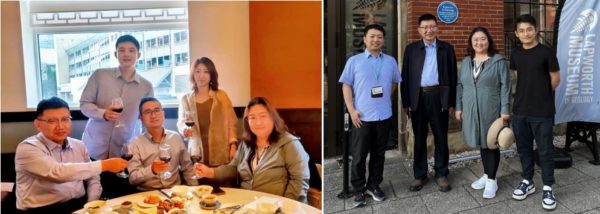
Left Photo: President Wang Shubin of the British Avenue Consulting Group with his colleagues (middle front row and back row) hosted a Cantonese meal for Professors Zhao and Yuan at Chung Ying Cantonese Restaurant, ranked third among the best Chinese restaurants in Birmingham. Right Photo (from left to right): Dr Yongjian Li, Prof ZHAO Kejin, Ms YUAN Lijuan and Dr Mengda WU in front of a blue plaque commemorating Professor Li Siguang at the University of Birmingham.
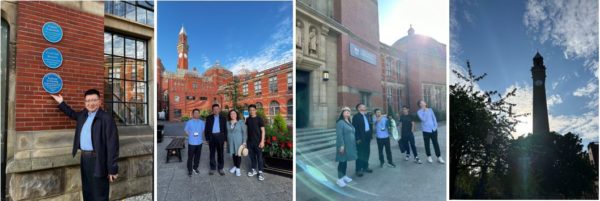
Photo 1(from left to right): Above the commemorative plaque for Professor Li Siguang pointed out by Professor Zhao Kejin, from top to bottom, are plaques for Charles Lapworth (1882-1923, pioneering work on mountain range formation), Frederick Shotton (1949-1974, advancing understanding of climate change), and Professor Li Siguang (1889-1971, geologist and politician, made pioneering contributions to Chinese geology and natural resource research, received a doctorate from the University of Birmingham in 1927). Photo 2: Chris and Maggie with Professors Zhao and Yuan in front of the Joseph Chamberlain Memorial Clock Tower (Old Joe) at the University of Birmingham’s Edgbaston Campus, showcasing the university’s history and neoclassical architectural style. Photos 3 and 4 (from left to right): Ms YUAN Lijuan, Prof ZHAO Kejin, Dr Yongjian Li, Dr Mengda Wu and Dr Deqing Rong of Birmingham University looking up at the clock tower.
The spread of human civilization is accompanied by human migration, with outward movement always being a positive choice for growth! A child cannot be sheltered under their parents’ wings forever, nor can a nation remain isolated in arrogance! The fusion of different bloodlines and genes gives birth to greater wisdom; stagnation and self-righteousness are undesirable! Buddhism teaches that despising others is a great sin, perhaps laying a spiritual foundation for integration! This integration does not mean the disappearance of uniqueness but finding commonality in differences, learning from others to accurately position oneself, and giving the unknown world necessary respect![2] Just like Birmingham’s extensive canal network or China’s historical Grand Canal, utilizing existing waterways and creating new channels have facilitated communication and trade across regions, diminishing divisions and differences, while conflict and opposition often come with isolation and barriers!
As the train heads towards Manchester, the scenery outside the window keeps shifting, and the future awaits our continuous exploration…
Edited by Xiangqun Chang, 1st August 2024
[1] Editor’s Note: This blog is edited by Xiangqun Chang. The extensive footnotes aim to use the blog as an example for help to understand the Global China Academy. The captions of all the photos, proofreading, and English translation were assisted by ChatGPT-4o.
- Professor ZHAO Kejin, Vice Dean of the School of Social Sciences and Director of the Global Industry Research Institute at Tsinghua University, along with his wife, Yuan Lijuan, were invited by the Global China Academy to conduct an investigation tour and academic exchanges in the UK from July 27 to August 24, 2024. The theme of the investigation tour is ‘Modernization of the UK and Its Global Development Experience.’ Their travel route included London-Oxford-Birmingham-Manchester-Glasgow-London-Cambridge, etc. At each location, volunteers arranged by the academy were present to receive or accompany them.
- We would like to thank the Zhejiang UK Association (ZJUKA) for providing contacts in Oxford, Birmingham, and Glasgow. ZJUKA was one of the supporters of the 2nd Global China Dialogue on ‘Transculturality and New Global Governance’ in 2015. About the ‘transculturality’, in the postscript of the Proceedings of the 1st Global China Dialogue: The Experience of China’s Modernization from a Comparative Perspective, I pointed out, ‘Another key outcome of this dialogue was the recognition of the similarities and differences between various types of dialogue. Cross-Cultural Dialogue refers to exchanges between people from different cultural backgrounds, aiming to understand and respect each other’s cultural differences; Intercultural Dialogue involves deep communication between different cultures to build bridges and reduce misunderstandings and conflicts; Transcultural Dialogue goes beyond the boundaries of a single culture, integrating elements from different cultures to create new cultural consensus. The Global China Dialogue platform will address the challenges of global governance through Transcultural Dialogue and explore the possibilities of mutual benefit, symbiosis, coexistence, and prosperity’ (Page 45, 2016).
- The book Walking for Peace: Transcultural Experiences from a Journey in China, edited by ZJUKA’s founding president Lady Xuelin Li Bates, has been published in both English and Chinese by our Global Century Press. This book is based on the blog posts of her husband, Lord Michael Bates, during his walk from Beijing to Hangzhou in 2015, marking the 70th anniversary of China’s victory in the Anti-Japanese War. The book is part of the ‘Three Eyes Transcultural Series,’ requiring authors to write with three perspectives: ethnic Chinese, culturally Chinese, or having some overseas living experience, and once own working experience. As a ‘son-in-law of China,’ some of Lord Bates’ content reflects this perspective. The book also presents a comparative viewpoint; while Lord Bates served as the UK’s Minister of State for International Development, he contemplated the shipbuilding industries of China, Korea, and the UK during his walk along the Grand Canal.
- The Birmingham visit of ZHAO Kejin and YUAN Lijuan was hosted and arranged by Wang Shubin, President of the UK Pathway Consultancy and Executive President of the Birmingham Chinatown Chamber of Commerce, along with his colleagues. The publication of this blog post on the Global China Academy’s website is also a token of appreciation for their assistance during Professor Zhao and Ms. Yuan’s visit to Birmingham.
[2] Editor’s Note:
- This blog, co-authored by ZHAO Kejin and YUAN Lijuan, vividly presents the 16-character methodology of renowned Chinese sociologist and anthropologist Fei Xiaotong: ‘Appreciate the beauty of oneself, appreciate the beauty of others, share the beauty with all, and achieve harmony in the world.’ For example, Mr Shubin Wang welcomed Professor Zhao and Ms. Yuan with Cantonese cuisine at Chung Ying Cantonese Restaurant, ranked third among the best Chinese restaurants in appreciating Chinese food in the UK. Numerous photos of canals, buildings, daily life, plaques commemorating scientists, and museums exhibit ‘appreciating the beauty of others.’ The coexistence of traditional and modern, natural, cultural, industrial elements, and diverse food cultures demonstrates ‘sharing the beauty with all.’ In their reflections at the end of the blog, the authors mention that ‘finding commonality in differences means learning from others to accurately position oneself and giving due respect to the unknown world!’ This echoes the transculturality promoted by the Global China Academy and, in some sense, surpasses the concept of ‘achieving harmony in the world,’ resonating with Fei’s later advocacy of ‘harmony but not uniformity.’
- Global Century Press publishes a series of books on eight themes, including: Chinese Concepts, Chinese Discourse, Understanding China and the World, Comparative Perspectives on China and the Chinese, Globalization of Chinese Social Sciences, “Three Eyes” Transcultural, Research on China’s Urbanization, and Cutting-edge and Avant-garde Studies. Each series includes academic works, policy research, investigation reports, and popular humanities and social science books. The book Walking for Peace has the nature of an investigation report, featuring over 300 colour photos and numerous photo descriptions provided by authors with sociological training, reflecting methods of visual sociology and visual anthropology. The blog also has a certain global and comparative perspective and many photos. Global Century Press looks forward to adding a new book to the ‘Three Eyes Transcultural Series’ titled ‘Investigating Modernization and Global Development Experience of Modern Britain’ (tentative title), with this blog possibly being included.

行走英国之伯明翰印象及感想
行走英国之伯明翰印象及感想[1]
2024年7月30-31日
赵可金 袁丽娟
7月30日早,经过大概两小时的车程,我们就从浓郁书卷气息的学术胜地的牛津来到了工业革命的发祥地伯明翰!伯明翰,作为英国中部的工业重镇,也是仅次于伦敦的英国第二大城市,同时它是个神奇的有故事的地方!
如果很多人还在从英王室的各种新闻、从英超的各大球队来认识英国,不可回避的是英国开启的两百多年的工业化时代,这一时代把整个人类的科技、财富、艺术、生活等推向了一个巅峰时期,也正式拉开了东西方近代的发展差距!我们不禁会问,这一切的发端,难道仅仅是因为瓦特眼中那一串串升腾的气泡吗?
酒店旁边便是伯明翰古老的运河故道,至今还保存了当年作为装卸码头的很多老建筑和设施遗迹,可以想象出当年的人声鼎沸场景和挥汗如雨的工作画面,人们为了获得更美好的未来生活,努力劳作!1776年前后的英国,生产还是落后的,市场还是割裂的,人们跟拥有更多财富的自由生活总有那么一段距离!很多人不惜长途跋涉,扬帆远行去大洋彼岸,去寻找自由美好的世界,而留下来的人,更需要在固有的结构中去苦苦思考,寻求突破!

左上图:这是位于英国伯明翰市中心的运河区景色,其地标包括“Regency Wharf”和“Rum Runner Works”这两个历史悠久的伯明翰运河网络的一部分。照片中红砖建筑和现代建筑的并存展现了这个区域的新旧结合。右上图:这是伯明翰市中心的运河区布林德利广场(Brindleyplace)及其周围区域,这里以其美丽的运河景观、历史建筑和现代设施而闻名。照片左侧是现代建筑,右侧前面是历史建筑,后面的高层建筑和运河上的桥梁增加了城市景观的层次感。运河上有一座拱桥连接两岸。这种新旧建筑的结合展示了伯明翰城市发展的多样性,以及既有历史底蕴又充满现代活力的城市特色。左下图:这是伯明翰运河区的一栋建筑,建筑上方有一个旧式吊臂和滑轮装置,这个吊臂曾用于运河货物的装卸,象征了过去的运河贸易和工业活动,显示了这个区域的工业历史。其外墙上有一幅巨大描绘植物的壁画,展示了伯明翰运河区工业、艺术与历史元素的结合。右下图:这是伯明翰运河区的一座铁桥,是由位于斯塔福德郡的以高质量铁制品闻名的霍斯利铁工厂(Horseley Iron Works)于1827年制造的。此桥梁展示了19世纪的工业技术和设计风格以及工业革命时期英国在工程和制造方面的成就。
在伯明翰是工业革命的发源地。然而,对于英国工业化的秘密,一直没有拓展到生态体系的研究上。英国是一个岛国,四周都是海洋,英国运输更依赖于海洋。然而,如果只关注海洋,是不会产生工业革命的,就像印度尼西亚、印度都没有产生工业革命。英国的工业革命与运河挖掘有很大关系,类似于在中国的大运河及河南林州看到的红旗渠。
英国在18世纪之前没有自己的运河体系。由于奔宁山脉和坎布里亚山脉的存在,导致英国的泰晤士河、奎文河、特伦特河等均向四周流入北海和爱尔兰海,英国内陆存不住水,交通很不便利,马车运输很落后。然而,随着工厂手工业向机器大工业转变,1721年出现了工厂,1776年瓦特发明蒸汽机,1830年出现了火车,1850年才建立了全国铁路网。显然,铁路是工业化的结果,不是工业化的动力。在铁路出现之前的一百多年时间里,工业化之所以加速发展,与1759年开凿布里奇沃特运河有关系。
之所以开凿运河,与曼彻斯特和伯明翰发现煤矿和铁矿有关系,运河运力要大大高于马车。这一运河的成功刺激了英国商人集资开凿运河体系。詹姆斯·布林德利规划了大交叉运河(The Grand Cross),将西部港口利物浦-默西河和东部港口伦敦泰晤士河、东北港口赫尔的亨伯河和西南港口布里斯托塞文河连为一体,伯明翰就处于大交叉运河的交叉点上,伯明翰获得了工业化的巨大机遇。在这样一个历史交叉点上,等待着伯明翰的就是能否抓住机遇了。
从这个意义上来说,伯明翰是大交叉运河拉来的工业城市,大交叉运河是英国工业化的母亲河。后来,在这一基础上,大交叉运河发展成为大串联运河(The Grand Junction),英国的生态体系彻底改变了,工业化的历史舞台已经搭建,日不落帝国的发动机已经开启,英国率先步入了世界历史的新时代。

左上图:这是伯明翰运河区的一段宁静水域,有三只加拿大鹅(Branta canadensis)在悠闲地游动。建筑右下角的标牌显示“The Malt House”(麦芽屋),是运河区的一家历史悠久的餐馆或酒吧,展示了自然与人造建筑的完美结合。右上图:这是伯明翰市中心运河区的一个景象。照片左侧是历史悠久的红砖工业或仓库建筑,现在可能被改造成现代用途。右侧是现代的玻璃建筑,与历史建筑形成了鲜明的对比。下图一(自左至右):这是伯明翰运河区的一个运河隧道内的视角向外看,可以看到红砖建筑和运河岸边的小路,运河上方的桥梁和远处的现代建筑,展示了伯明翰运河区新旧建筑融合的特点。下图二:这是位于英国伯明翰市中心的“Mailbox”(邮箱)建筑的一部分,这个标志性建筑集购物、餐饮、酒店和办公等功能于一体。照片中可以看到一些餐厅或酒吧的标志,如“BOX”和“Pitcher & Piano”,这些都是位于 Mailbox 内的餐饮场所。Mailbox 的建筑风格结合了现代和传统元素,有点像上海的城隍庙附近的商业区,也许现代大型购物娱乐等综合体由此获得了灵感。下图三:这是英国伯明翰一家传统酒吧的外观,门旁的标牌上写的服务项目包括传统手工拉制啤酒和苹果酒、加热的吸烟区、开放火炉、酒吧小吃、残疾人设施,体现了英国酒吧的传统装饰风格和典型氛围。下图一:这是位于伯明翰维多利亚广场(Victoria Square)的一座雕像,雕像基座上刻字说明这是爱德华七世(Edward VII),他在1901-1910年期间担任英国国王。作为维多利亚女王的长子, 他在统治英国期间,通过推动社会改革和现代外交政策,显著提升了英国在国际舞台上的地位和社会进步,该雕像是为了纪念他对英国的贡献而建造的。广场上除了爱德华七世的雕像外,还有许多其他具有历史意义的纪念碑和艺术品。维多利亚广场也是市政厅(Birmingham Town Hall)和伯明翰博物馆与美术馆(Birmingham Museum and Art Gallery)等重要建筑的所在地。
如果说詹姆斯·布林德利规划的大交叉运河(The Grand Cross)开启了英国率先步入世界历史新时代的发动机,那么詹姆斯·瓦特发现的蒸汽的工业价值,进而发明了转化这种价值的机器,使人类的生产生活的样态发生了翻天覆地的变化。此后,一群又一群的后来者,把这场史无前例的发现和发明大潮推向一个个新高度!

这两张照片拍自伯明翰的Thinktank伯明翰科学博物馆(Thinktank Birmingham Science Museum),该博物馆位于伯明翰千禧点(Millennium Point),是一个互动式科学博物馆,展示了从工业革命时期的蒸汽机车到现代科技的各种展品。左图:这是一台古老的蒸汽机车,展示了工业革命时期机械制造的复杂性和美学。其外观包括大型的驱动轮、复杂的管道系统和各种阀门和仪表。其工作原理是通过燃烧煤炭或木材来加热水,产生蒸汽,蒸汽的压力驱动活塞运动,进而带动轮子旋转,展示了蒸汽动力时代的工程技术成就及科技进步。蒸汽机车曾在19世纪和20世纪初期广泛用于工业和运输领域,推动了工业革命的进程。右图:这是在19世纪末期非常流行的高轮自行车(Penny-farthing),也被称为“前高后低自行车”。前高后低自行车的设计初衷是为了增加骑行的速度,因为较大的前轮每转一圈可以覆盖更大的距离,但由于其稳定性差和容易导致摔倒受伤,后来被更加安全和实用的现代自行车所取代。
我们这个世界,是个以能量为基准的时空组合。以人类现有的认知能力和水平,我们仅仅可以感知和利用时空能量的5%左右,而大量的未知世界等着我们去探索!瓦特以及他的后来者所具有的探索精神,在他们有限的资源前提下,已经开拓出如此辉煌的局面。试想未来,我们更是有无数种可能,在有限与无限的博弈中,去寻求生命的价值!我们所能看到的,总是我们所拥有的总和的一小部分。发现,针对存量;发明,针对增量;探索,针对无限量,这也许就是汉语词意的博大精深,准确而含蓄!而在对美好生活的向往上,各个种族、国家、文明,又毫无差别!
在伯明翰仅仅两天的行程中,另一个让我触动很深的是这里的一群人,一群来自故乡的人,海外华人!他们为生计、为学业……离开故土,扎根在这里,在东西方文明的交集地带寻求发展,所面对的困难和挑战可想而知!但是,他们又是智慧的一群,以他们强大的生命力,找到了合适自己的生存空间,发挥自身的能量优势,利用当地的能量环境,融为一体!无论从达尔文的自然选择出发,还是中华文化讲的树挪死人挪活的古训,迁徙就是开辟新的能量场。

左图:英国大道咨询集团的王澍斌总裁(前排中间)与他的同事在英国最佳中餐馆排名第三的伯明翰粤菜馆(Chung Ying Cantonese Restaurant)用粤菜为赵袁二位老师接风。右图:伯大的李永健博士和武孟达博士在伯明翰大学的楼前与赵袁二位老师在有李四光教授的蓝色纪念牌前合影。

图一 (从左到右):在赵可金教授手指着的李四光教授的纪念牌的上面,自上而下依次是:查尔斯·拉普沃斯(Charles Lapworth, 1882-1923,进行了关于山带形成的开创性工作)、弗雷德里克·肖顿(Frederick Shotton, 1949-1974,推进了对气候变化的理解)和李四光教授(Professor Li Siguang, 1889-1971,地质学家和政治家,为中国地质学和自然资源研究做出了开创性贡献,他于1927年获伯明翰大学博士学位)。图二:Chris和Maggie与赵袁二位老师在伯明翰大学主校园爱德巴斯顿校园(Edgbaston Campus)的一个标志性建筑钟楼前合影。这座钟楼的正式名称是“约瑟夫·张伯伦钟楼”(Joseph Chamberlain Memorial Clock Tower),又被称为“老乔”(Old Joe)。这一建筑群展示了该大学的历史和新古典时期的建筑风格。图三、四:赵袁二位老师与伯大的李永健博士,武孟达博士,荣德清博士仰望钟塔。
人类文明的传播伴随着人类迁徙的脚步,脚尖向外永远都是成长的正态选择!一个孩子不能闭锁在父母的羽翼下,一个民族不能封闭在自大的氛围中!不同血脉基因的融合,诞生出更强大的智慧,固步自封、自以为是不可取!佛家讲轻视别人是极大的罪恶,也许就是为融合做精神托底!而这种融合,不是独特性的消失,而是在差异性中找共性,是以他人为鉴,给自己准确的定位,给予未知世界必要的尊重![2] 就像伯明翰四通八达的运河,像中国历代修葺的大运河,其中有固有河道的利用,也有人工接洽的开凿,顺畅的水道便利了东西南北的沟通,互通有无淡化了分歧和差异,而冲突和对立,往往伴随的都是孤立隔绝和阻断!
列车向着曼彻斯特行驶,窗外的景色不断推移,前方等着我们不断去探索……
常向群 编,2024年8月1日
[1] 编者注:本博客图文由常向群编辑并加注,较多的脚注及图说旨在以此博客为例帮助读者了解全球中国学术院。校对和图说由ChatGPT-4o辅助完成:
- 清华大学社会科学院副院长、全球产业研究院院长赵可金教授及夫人袁丽娟女士应全球中国学术院的邀请,于2024年7月27日至8月24日到英国展开调研、访问和学术交流。调研访问的主题是“近代英国现代化及其全球发展经验研究”。他们的游走路线是伦敦-牛津-伯明翰-曼彻斯特-格拉斯哥-伦敦-剑桥等。每到一处都有由学术院安排的志愿人员接待或陪同。
- 感谢英国浙江联谊会(ZJUKA)帮我们提供了牛津、伯明翰和格拉斯哥的接待人员。ZJUKA曾经是第二届全球中国对话“转文化(transculturality)与新型全球治理”(2015)的支持单位。关于”转文化“,我在第一届全球中国对话”中国现代化进程的经验教训与其它发展中国家和地区之比较“文集的“编后语”中曾指出,“此次对话的另一个关键成果是认识到几种对话的异同。跨文化对话(Cross-Cultural Dialogue)指不同文化背景的人之间的交流,旨在理解和尊重彼此的文化差异;际文化对 话 (Intercultural Dialogue)指在不同文化之间的深度交流,以建立沟通桥梁,减少误解和 冲突;转文化对话(Transcultural Dialogue)指超越单一文化界限的交流,融合不同文化元 素,创造新的文化共识。全球中国对话平台将通过转文化对话来应对全球治理的挑战,并探索互惠共生、共存和繁荣的可能性“(第45页, 2016)。
- ZJUKA的创始会长李雪琳·贝茨勋爵夫人(Lady Xuelin Li Bates)编辑的《为和平徒步——中国之旅的转文化体验》一书由我们环球世界出版社出版了英文版和中文版。此书是基于雪琳的丈夫麦克·贝茨勋爵(Michael Bates)在2015年中国抗日战争胜利70周年之际的北京—杭州徒步日志博文。此书被列为“三只眼转文化系列丛书”,要求作者在写作时带有华人、文化华人或在海外有一定生活体验的华人和职业人三重视野。麦克·贝茨勋爵是“中国女婿”,书中有的内容带有相关视野。此书还呈现出一定的比较视野,麦克时任英国国际发展部国务大臣,在沿着大运河徒步时也对中国、韩国和英国的造船业做了一定的思考。
- 这次赵可金和及袁丽娟的伯明翰之行是由英国大道咨询集团总裁兼伯明翰华埠商会执行会长的王澍斌先生及他的朋友Chris和Maggie接待安排的。全球中国学术院网站发表这篇博文也是表达对他们在赵教授及夫人的伯明翰之行提供帮助的感谢。
[2] 编者注:
- 赵可金和及袁丽娟合写的“伯明翰印象记”,生动地呈现了中国著名社会学家和人类学家费孝通的16字方法论:“各美其美、美人之美、美美与共、天下大同”。例如,英国大道咨询集团的王澍斌总裁在英国最佳中餐馆排名第三的伯明翰粤菜馆(Chung Ying Cantonese Restaurant)用粤菜为赵教授和袁女士接风(在英国欣赏中国美食);大量的运河、建筑、生活、科学家纪念牌、博物馆等照片呈现的是“美人之美”;从传统到现代、自然、人文与工业以及不同饮食文化的并存,展现出“美美与共”的态势;作者在文章最后的体会中提到“这种融合,不是独特性的消失,在差异性中找共性,是以他人为鉴,给自己准确的定位,给予未知世界必要的尊重”,这个观点与注释1中几次提及的全球中国学术院推动的转文化观念非常接近,在某种意义上超越了“天下大同”的境界,与费先生晚年倡导的“和而不同”理念有异曲同工之妙。
- 环球世界出版社出版系列丛书,目前研发了八个主题,如:中华概念、中华话语、读懂中国与世界、中国与中华比较视野、中国社会科学全球化、“三眼”转文化、中国城镇化研究和新锐与前沿。每套丛书包括学术著作、政策性研究、考察报告、人文社科普及性读物等不同形式的著述。《为和平徒步》一书有考察报考的性质,包括了300多幅彩照,有社会学专业训练的作者提供的大量的图片说明,体现了视觉社会学和视觉人类学的方法。“伯明翰印象记”一文也具有一定的全球和比较视野及许多照片。环球世界出版社期待在“三只眼转文化系列丛书”中增加一本新书《近代英国现代化及其全球发展经验考察录》(讨论书名),此文可作为其中的一篇。
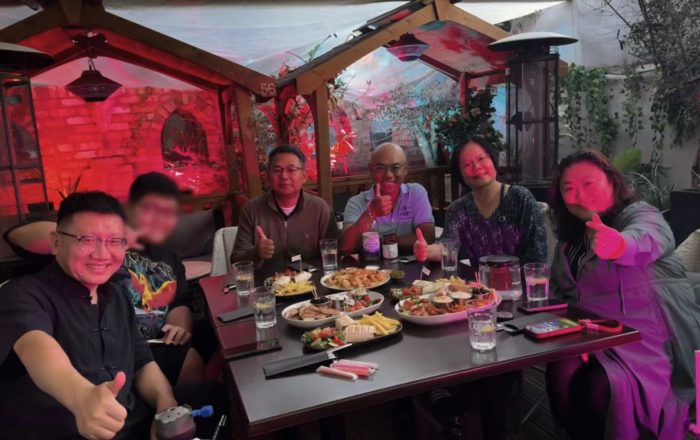
Field Visits on British Modernization and Its Global Development Experience (July – August 2024)
On January 20, 2024, Professor Zhao Kejin, Deputy Dean of the School of Social Sciences at Tsinghua University, visited the Global China Academy Centre. He brought with him the last wish of the late Professor LI Qiang (1950-2023), former Chinese Chair of the Global China Academy Council—namely, to continue developing the relationship between the two institutions. Professor Zhao also discussed matters of cooperation. Additionally, he brought a gift from Professor FANG Lili, President of the China Chinese for Anthropology of Arts, her book Fei Xiaotong’s Inquiry: How Human Society Can Achieve ‘Beauty in Diversity and Shared Harmony’, as well as a personal gift of his own books.

2024年1月20日,清华大学社会科学院副院长赵可金教授访问了全球中国学术院中心,带来了已故中国全球学术院理事会前中方主席李强教授(1950-2023)的遗愿——继续发展两院关系,并就合作事宜进行了讨论。赵教授同时还带来了中国艺术人类学会会长方李莉教授的赠书《费孝通之问:人类社会如何走向“美美与共”》以及他个人的赠书。
李强教授作为学术院理事会的中方主席,他在去年12月的突然离世对我们学术院来说是一个重大的损失【注释1】。我们怀着感激之情,铭记他过去十年来对我们工作的支持,以及他为两院合作关系所做的贡献。例如,在第六届全球中国对话:世界和平治理中,他推荐赵可金教授前来英国做大会致辞;在筹备第七届全球中国对话:全球治理改革期间,他确认清华大学社会科学院为全球中国对话系列论坛的支持单位,清华大学全球产业研究院为赞助单位,并提供了包括来自清华大学社会科学院和中国社科院的所有中方发言嘉宾。尽管受到新冠疫情的影响,依然确保了我们的第七届全球中国对话于2021年在英国学术院成功举办了线下线上融合会议。【注释1】
为了继续加强和巩固双方的联系,我们希望通过与清华大学社会科学学院延续并深化这种合作关系。继今年1月20日赵可金教授来访时讨论的暑期访问计划后,6月初赵教授与常教授就两个访英项目进行了确认:一个是在此之前的为期22天(7月27日至8月17日)的赵可金教授对近代英国现代化及其全球发展经验的考察。另一个是为期八天(8月17日-24日)的京沪四高校人工智能发展及全球治理对英国的访问(详情点击链接)。学术院信托会和理事会对清华学者来英国访问高度重视,学术院理事会主席托尼·麦肯勒里 Tony McEnery 教授与院长常向群教授基于以前的邀请函模板上联名签发了邀请函,明确了所有的活动安排和服务均由全球中国学术院提供,费用由清华大学全球产业研究院承担。尽管是假期,我们学术院确保每一项重要活动都有学术院不同方面的领导或院士参加。学术院的行政团队表示,与以往的商业外包服务不同,这次在主要接待环节将由我们团队的负责人亲自接待。
本页是全球中国学术院帮助和参与赵老师完成这个项目的记录。在策划方面,相关城市的主要参访的地方和介绍及其路线基本上是我们提供的。在清华大学社科学院的要求下,我们在伦敦、牛津、伯明翰、曼彻斯特、格拉斯哥、剑桥等地京可能安排了学者会见,而且全程安排了志愿者、友人和专业人士进行接应或陪同,并建立了微信群及时分享信息,确保了每个环节顺利进行。以下将按时间顺序以图文方式简要回顾这一过程,不仅是为了记录活动,更是为了公开透明地展示我们所做的工作和付出的努力。【注释2】
7月27日,伦敦(一)
全球中国学术院负责活动的官员梁凯在伦敦希思罗机场 (T2) 于17:45迎接了赵可金教授及其夫人和儿子。由于出关延误,他们于20:30才抵达 The Madonna Halley Hotel的The Shisha Garden。这是一家希腊风格的花园餐厅,其环境充满了异国情调,装饰着茂密的植被和精心设计的灯光,营造出一种神秘而迷幻的氛围。学术院后勤经理刘大卫和常教授在此为他们设宴接风。
晚餐的菜品也很多样化,例如:小吃拼盘包括哈罗米奶酪、鹰嘴豆泥、酸奶黄瓜酱、皮塔饼、橄榄、黄瓜和番茄沙拉;鸡肉小吃拼盘则在此基础上还包括鸡胸肉片。大家对哈罗米奶酪印象深刻,感觉很像豆腐干。还有一些混合卷饼,包括腌制鸡胸肉和羊肉,配上酸奶黄瓜酱、甜辣酱、酸黄瓜和粉色腌菜,包裹在玉米饼中,搭配薯条或沙拉;凯撒鸡肉卷饼则包括香脆鸡柳、生菜、西红柿、凯撒酱和一点甜辣酱,同样包裹在玉米饼中,搭配薯条或沙拉。此外,还有玉米片,上面撒有奶酪和肉丁,配有莎莎酱、酸奶油、鳄梨酱、腌辣椒和奶酪蘸酱。这里的披萨的味道也很好。这些菜肴展示了融合风味的特色,提供了丰富的口感和味觉体验,突显了与中餐不同的另一种色香味俱全的餐点及分享式的就餐方式。

餐后的“饮品”欢迎聚会是在赵老师及家人到学术院“院士之家”稍事安顿后举办的。有大果盘包括新鲜水果和蔬菜及各类小吃,还有新扎的柠檬薄荷饮料,以及“睡觉茶”。

7月28-30日,牛津。
常教授开车把赵教授夫妇的行李送往牛津里奥纳多皇家酒店 Leonardo Royal Hotel Oxford,再把他们的儿子送到牛津拉德利公学去上暑校,并安顿好。然后与赵教授夫妇一起参观了阿什莫林博物馆 Ashmolean Museum,这是英语世界中第一个成立的大学博物馆,也是第一个公众博物馆 Public Museum。我们按照历史的时间顺序和地区欣赏不同的文物和文明,同时在记忆中搜索他们与同期中国的文物与文明的异同。

午餐会安排在Parsonage Grill,是牛津的精致的欧洲和英国菜肴餐馆,距离阿什莫林博物馆仅0.2英里。与牛津大学全球与区域研究学院当代中国研究项目高级研究员叶玛丽教授Maria Jaschok 会谈,她也是全球中国学术院信托会主席和院士。主要讨论全球治理与AI和国际关系与秩序等问题。
学术院安排在牛津负责接待的是住在牛津的伦敦大学学院博士候选人程语桐(上排照片右数第一张,左边第一位)。她于7月28日下午两点在阿什莫林博物馆门前与我们几位老师会面。之后我们一起参关了博物馆。
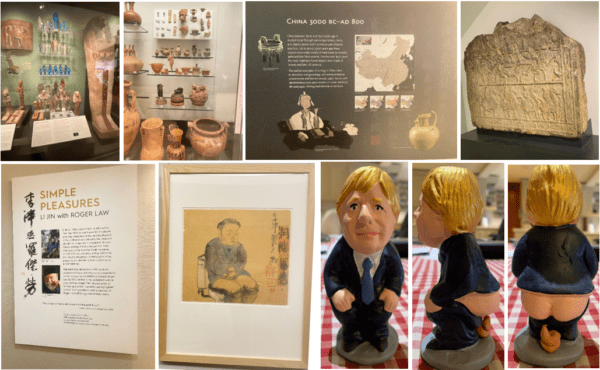
在阿什莫林博物馆有一个具有鲜明跨文化意味的中西联展:一边是中国当代画家李津,以水墨描绘饮食、如厕、闲坐等日常身体场景,将“不入画”的生活细节带入文人画传统;另一边是英国讽刺艺术家 罗杰·劳Roger Law,以玩偶化、卡通化的雕塑解构公众人物与政治权威,使权力回到可被观看、可被调侃的肉身之中。两位艺术家分属不同文化脉络,却都以身体与日常为入口,消解宏大叙事,使文明在最具体的姿态中显形。
正是在这样的展览语境中,当叶玛丽教授向我们介绍李津那幅描绘人物坐在坐便上的画作前时,常教授忽然产生了一个生活化的联想:她公公家有一尊英国前首相 鲍里斯·约翰逊 Boris Johnson 的讽刺小雕塑。那件小雕塑正面庄重、背面滑稽,其幽默的身体处理方式,是西班牙加泰罗尼亚地区的民俗传统“排便人偶” Caganer的作品:一种起源于18世纪、象征土地丰饶与好运的形象,后来被用于塑造各类公众人物,以笑意消解权威、拉近权力与日常生活的距离。
这一联想让人意识到,李津的水墨人物与 Roger Law 的讽刺雕塑,并非仅仅在展厅中并置,而是在更广阔的生活经验中相互呼应:当身体成为共同语言,博物馆、家庭记忆与旅游文化在同一瞬间被串联起来,转文化理解也因此自然发生。
在一起参观完博物馆后,我们找到了去赵教授下榻的酒店的6号线公交车站(下面照片左一)。由于语桐告知30日去伯明翰的铁路罢工,于是我们一起到长途汽车站协助赵老师买好了去伯明翰的车票。之后,语桐陪他们一起参观了牛津的著名地标,包括圆顶图书馆和Bodleian Library。又前往Cover Market,在那里一边闲逛,一边交流。

7月29日清晨,语桐在6号线公交车站接到赵教授夫妇一同前往牛津大学中国中心。由于常教授事先联系了该中心的图书馆馆长苏诺 Mamtimyn Sunuodula 博士,他非常热情地接待了他们,并带领我们参观了中心的各个设施。在参观过程中,苏诺馆长详细介绍了中心的历史、发展情况以及在中英文化交流中所扮演的重要角色(上排照片中间三张)。参观结束后,语桐陪他们沿着大学公园步行前往自然历史博物馆,路过牛津大学全球与区域研究学院(上排照片右数第一张)。在自然历史博物馆,他们欣赏了馆内丰富的展品,感受到牛津浓厚的学术底蕴。
7月30日上午,语桐陪同赵教授夫妇前往牛津长途汽车站,把他们送到了前往伯明翰的长途汽车。
7月30-31日,伯明翰
7月30日中午,赵教授夫妇乘长途汽车到达了伯明翰,下榻在伯明翰市中心的皇冠假日酒店。我们学术院安排的英国大道咨询集团王澍斌总裁和他的两位同事,当晚为他们在英国排名第三的、伯明翰最好的中英粤菜餐厅Chung Ying Cantonese Restaurant为赵老师夫妇接风(下排照片左1)。

7月31日上午,王总陪赵教授夫妇沿着伯明翰历史最悠久的运河进行了步行探索,这里是由煤炭个钢铁贸易而发展起来的,也是著名电视剧《浴血黑帮》 peaky blander的取景地。然后他们去了智库伯明罕科学博物馆 Thinktank Birmingham Science Museum ,伯明翰科学历史博物馆,完整介绍了作为中部重要工业城市的发展史。
下午,王总陪赵老师夫妇参观了著名的红砖大学伯明翰大学,走过英国最高的单体钟楼 (101米高) ,百年历史的主建筑群以及李四光先生曾学习研究的教学楼。王总还安排了两位博士为他们介绍情况 (上排照片左2-3)。
然后,他们在王总家小憩交流,并一同品尝了苏格兰威士忌 (上排照片右1-2)。尽管伯明翰并不位于苏格兰,但作为英国最具多元性和国际化特征的城市之一,这里不仅汇集了来自苏格兰的威士忌,也汇聚了世界各地的酒类文化。常教授在交流中指出,在伯明翰品尝苏格兰威士忌,早已超越单纯的味觉体验,而成为一种日常生活中的饮文化学习:它让地方性传统在跨区域流动中被重新理解,也让人真切感受到苏格兰文化如何在英国其他地区持续传播并被吸收。这种通过物质、味觉与社交实践实现的文化转移,本身正是一种发生在日常生活中的苏格兰和英格兰之间的转文化过程。
根据赵教授夫妇在我们的微信群里发的感想和照片,常教授也有感而发,对所有的图片做了解释,为他们编辑了一篇“行走英国之伯明翰印象及感想”,并加入了一些注释。
8月1-2日,曼彻斯特
8月1日,我们安排的接应赵教授夫妇的接应是《英国社会学评论》研究博士后研究员胡正栋博士,他于上午10点半在曼彻斯特皮卡迪利车站接到赵教授夫妇后,帮他们拿着行李直接就city walk,边走边介绍曼彻斯特的一些景点,直接送达曼彻斯特市中心万豪酒店 (下排照片左1)。胡博士于3日一大早再来到酒店,把赵教授夫妇送到皮卡迪利火车站,送往了去格拉斯哥的火车 (下排照片右1 )。在曼彻斯特停留的两天里,赵教授夫妇基本按照学术院根据其考察主题所规划的路线展开参访。该路线围绕英国工业化、城市转型与社会文化制度的演变展开,通过博物馆、历史街区与公共文化空间的组合,让考察在行走与观看中逐步展开,也为后续城市之间的比较提供了共同的经验基础。

在根据赵教授在微信群分享的信息,在之后的两天里,他们参观了曼彻斯特科学与工业博物馆 Science and Industry Museum,作为世界上第一个工业化城市,该馆专注于展示科学、技术和工业发展历史,馆内收藏了许多与曼彻斯特工业革命有关的展品。还参观了约翰·赖兰兹图书馆John Rylands Library,馆内收藏的许多珍贵的手稿和古籍成为一座学术宝库,其哥特式建筑风格成为曼彻斯特最著名的历史建筑之一。曼彻斯特中央图书馆Manchester Central Library则是新古典主义风格,其圆顶和柱廊设计深受罗马和希腊古典建筑的影响(上图左2-4)。
他们还参观了曼彻斯特的罗马堡垒遗址Castlefield,这是曼彻斯特市内保存较好的古老罗马防御工事的遗迹。是英国的重要考古遗址之一。后方隐约可见现代的高楼建筑,构成曼彻斯特城市现代化与历史文化交织的一个典型景象。曼彻斯特大教堂Manchester Cathedral,建于中世纪的这座哥特式建筑以其高耸的塔楼、高大的窗户、精美的彩色玻璃窗、复杂的石雕和尖顶设计闻名。教堂的内部和外部都具有极高的艺术和历史价值。
之后,他们前往曼彻斯特北区的 Northern Quarter 史密斯菲尔德市场Smithfield Market。这里保留着大量老建筑与复古风格的历史街区,但原本的工业与批发空间如今已被改造为商店、餐厅和艺术空间,呈现出一种典型的城市再生景观。
这一行程并非偶然,而是常教授在整体路线规划中刻意安排的一站:它所呈现的城市转型经验,在不同国家与制度背景下反复出现,具有高度的可比较性。她在行程设计时便意识到,这类空间在全球许多城市中都能找到相似形态——如法国的蓬皮杜艺术中心、伦敦的泰特现代美术馆、以及北京的798艺术区等。通过把曼彻斯特的这一站放入整体考察路线之中,她希望让参与者在不同城市的行走中,逐步体会到工业遗产如何在不同文化与制度语境中被重新激活。这种通过行程设计实现的比较经验,本身正是一种转文化实践:它不是发生在展厅或课堂中,而是通过移动、观看与路径安排,在行走中生成理解。
人民历史博物馆 The People’s History Museum是一个独特的文化空间,致力于保存和传承关于工人阶级历史的记忆,英国劳动人民和社会变革的历史,特别是工人阶级的斗争、民主发展和社会正义运动的历史。帝国战争博物馆 Imperial War Museum 以其现代、独特的设计以及深刻的展览内容成为了曼彻斯特及其周边地区的重要文化场所,专注于展示20世纪以来战争对人们生活的影响。
8月3-7日,格拉斯哥
8月3日上午11点多,我们安排的志愿人员、格拉斯哥大学电子信息工程专业的研究生南宇航到格拉斯哥火车站,把赵老师夫妇接送到SEC万怡酒店。她又于8月7日把他们送到机场回伦敦。期间也参加了部分陪同工作。
8月4日下午2点,我们安排的另一位志愿人员英国中非桥的执行总裁周霄飞博士,介绍了一位研究生卢纳熙,与南宇航一起陪同赵老师夫妇参观了历史文化遗迹格拉斯哥大学主楼,格拉斯哥大学博物馆,还有一些教学楼,如亚当斯密楼,商学院,统计楼,这些都是周博士读书和工作过的地方(见最后一组照片左边四张)。大家还交流一下这个格拉斯哥的历史经济文化,包括造船业中心,还有苏格兰来自英国一些工业化的进程方面,并探讨了一些学术问题探讨。宇航补充道,赵老师还跟他们探讨了人工智能与人文科学之间的联系,以及国内外居住的不同感受。
在格拉斯哥大学博物馆,周博士向赵教授夫妇介绍了一幅镇馆之宝——《坤舆全图》(下面组图左二两张)。他们在微信群里分享后,常教授指出了这个转文化产品transcultural prodect的多重性。1)继利玛窦(Matteo Ricci)于1602年坤舆万国全图 Kunyu Wanguo Quantu后,这张《坤舆全图》是结合了西方和东方的地理知识的第一张引入中国的现代世界地图 。“坤”在中国古代哲学中代表地,是《易经》中八卦之一,象征着大地和母性;“舆”在古代汉语中有车的意思,但在地理学和制图学中,它指的是承载万物的大地或世界。因此,“坤舆”可以理解为“大地”或“世界”的意思。与其他西方地图的不同之处。这个名字强调了它的中国背景和中西结合的特性。2)“全图”即“完整的地图”,表示这是一张涵盖整个世界的地图。3)比利时科学家和耶稣会传教士南怀仁(Ferdinand Verbiest)受清朝皇帝康熙的邀请,成为了钦天监的天文学家,其《坤舆全图》反映了中西方在17世纪的科学和文化交流。4)利玛窦和南怀仁在中国绘制的世界地图,均结合了当时最新的西方地理知识和中国的传统地理知识。这种融合不仅为中国人提供了一个全面了解世界的机会,也促进了中西方在地理学、科技、文化、政治、外交等多方面的交流。
8月5日,赵可金教授夫妇参观了格拉斯哥大教堂Glasgow Cathedral——这是一座始建于中世纪的哥特式教堂,也是苏格兰保存最完整的中世纪宗教建筑之一;随后在雨中走访了河滨博物馆Riverside Museum与克莱德河沿岸。河滨博物馆位于克莱德河畔,集中展示了格拉斯哥的工业、交通与造船历史,是理解这座城市工业化进程的重要窗口。其后,他们乘坐城市观光巴士Sightseeing Tour 环绕市中心,对格拉斯哥的历史结构与城市风貌形成了整体认识。

常教授在与哥拉斯哥大学社会政治科学学院政治学教授、苏格兰中国研究中心主任杜珍Jane Duckett 教授联系赵可金教授的安排时,根据赵教授考察的主题,她建议应该去Lanark小镇参观New Lanark。
8月6日 上午,赵可金教授从格拉斯哥中央火车站Glasgow Central 乘坐火车约四十五分钟抵达拉纳克 Lanark 小镇,前往参观由罗伯特·欧文 Robert Owen 创建的社会主义公社遗址。列车抵达后,他步行了二十多分钟,来到位于克莱德河谷中的新拉纳克 New Lanark村庄,距离拉纳克镇约2.2公里。新拉纳克最早由苏格兰商人大卫·戴尔David Dale 于1786年建立,原计划与水力纺纱机发明者理查德·阿克莱特 Richard Arkwright 合作,利用湍急的克莱德河水力兴建纺织工厂,将这里打造为未来的苏格兰“曼彻斯特”。赵可金教授夫妇实地参观了新拉纳克世界遗产地 New Lanark,对早期工业化与社会改革实践有了更直观的认识(见上面照片右边两张)。
当日下午3点,赵可金教授返回格拉斯哥大学,与杜珍Jane Duckett 教授在格拉斯哥大学孔子学院举行会谈。此次会谈得以促成,得益于正在格拉斯哥大学进行学术交流的南开大学前副校长、全球中国学术院终身院士朱光磊教授的协助与引荐。杜珍教授对赵可金教授采纳其建议,并于8月5日下午和8月6日上午分别参访河滨博物馆Riverside Museum与新拉纳克New Lanark 表示欣慰,认为此次实地考察收获颇丰。

以上右边的照片从左至右:赵可金夫人、格大孔院外方院长龙多、杜珍、赵可金、朱光磊、孔子学院中方院长周申(南开大学经济学教授)。
常教授认为,赵可金教授在新拉纳克(New Lanark)村庄的参访,与清华大学社会科学学院长期开展的清河实验之间,具有开展比较研究的可能。两者虽处于完全不同的历史与制度语境,却同样以社区为尺度,通过制度设计、社会实践与日常生活的持续互动,探索社会秩序与公共治理的可能路径。
此外,清河实验本身也具有重要的纵向比较价值。早在近百年前,1928年,燕京大学社会学家杨开道、许世廉等学者就在河北清河开展乡村建设实践,试图通过社会工作方法改造乡村社会,这一实践被称为民国时期的“清河实验”,是中国早期乡村现代化建设的重要社会实践之一。2014年起,清华大学社会学系李强教授等人在北京市海淀区清河街道启动了新一轮创新城市治理试点。2016年,李强教授邀请马丁·阿尔布劳(Martin Albrow)、常向群教授以及韩国学者韩相震教授等参观新“清河实验”点,该实验以城市社区治理为主题,开展参与式社区更新与社会治理创新,旨在打破传统行政主导模式,引入社会工作专业方法,推动居民广泛参与社区公共事务治理,是探索中国特色城市社会治理现代化的典型案例。围绕这一实践,李强教授及其学生已形成了一系列阶段性研究成果。常教授认为,若能在此基础上进一步补充相关研究,并与本次英国考察中获得的新拉纳克历史材料与现实观察相结合,不仅可以深化对制度演化与社会实验的比较分析,也有望形成一篇结构完整、具有理论厚度的转文化研究文章。
在赵教授行程交流的微信群中,他感慨道:“英国的乡村太美了,我终于理解了为什么代议民主会起源于英国乡村。”对此,梁凯回应说:“英国的人文灵魂,确实在乡村。”这段简短的交流,成为此次考察中一个意味深长的瞬间,也点出了乡村空间在英国政治文化与社会传统中的深层意义。
8月7日, 伦敦(二)
中午赵教授夫妇回到了伦敦,按计划是休整一下。稍事休息后,约两点出发,赵教授夫妇在常教授的陪同下,继续考察学术院的院士之家周边出行购物等情况;同时了解代表团的住宿安排等。
先是去了Edgware地铁终点站和购物中心,向工作人员了解伦敦交通付费和线路等情况;接着去了Mill Hill Broadway火车站;经过Rising Sun 餐馆(赵教授居然认出来了,显然他是做过功课的过,因为学术院安排8月13日这里用餐),又经过一个老人养老社区,我们下来考察了一番(见下组照片上排左数第一、二张)。
从养老社区出来后在转盘边有一家牛肉餐馆Miller & Carter – Steakhouse Restaurant ,我们的院士之家的“行走聊天”的第五条路线包括在这家餐馆用餐。然后我们去了一家购物园Borehamwood Shopping Park。常教授向赵教授夫妇介绍,之前在Edgware购物中心里的Sainsbury’s 和购物园附近的Tesco是中等超市;Waitrose和M&S是较高档的超市;ASDA和Morrisons大概是中等偏下;有两家德国的小超市Lido和Aldi属于比较低端的,正好在这个购物园的M&S一边一个(见下组照片上排右数第二张)。
之后我们去了这次代表团下榻的酒店 The Manor Elstree 考察。该酒店是位于赫特福德郡博勒姆伍德Elstree, Borehamwood的都铎风格乡村庄园酒店,距离伦敦市中心乘火车约25–30分钟。该庄园最初建于16世纪中期,20世纪60年代改建为酒店,融合了历史建筑风貌与现代舒适设施。酒店拥有约49间风格各异的客房与套房,坐落在10余英亩的花园与林地之中,环境宁静宜人。酒店设有餐厅、酒廊和下午茶空间,并配备宴会厅与会议设施,适合举办婚礼、学术会议及各类社交活动。其幽静的乡村氛围与便捷的区位,使其成为兼具历史感与实用性的理想下榻之所。赵老师夫妇对此非常满意,认为这里可以是以后与学术院合作培训企业家的地方。(见下组照片下排左数第1-3张)。我们还与没住在酒店,仅到这里来喝茶徒步的人一起聊天。由此,常教授想到,这里可为学术院院士之家的Walking and talking增加的第7条路线。
回到院士之家,赵教授用在购物园买的食材亲自下厨,做了三个菜:鸡肉丝炒茄子柳,鸡肉丝炒土豆丝,鸡蛋炒西红柿,我做了麻辣洋葱豆干丝,但是忘了煮饭,好在我们都不大吃主食,土豆和豆腐都有碳水化合物,开心地享用了我们自己动手的成果。这个经历非常难忘,不仅是这近一个月来,唯一的一次接受赵老师夫妇请吃的饭,赵老师不小心打破了我的一个精美的陶彩盘,虽然被修复了,也成为了永久的纪念(见下组照片下排右数第二张)。
晚饭后,赵教授与常教授到米尔希尔Mill Hill Gold Club去打高尔夫球。该改俱乐部建于1927年,坐落于167英亩林地,是米德尔塞克斯最具历史的球场之一。球场由J. F. Abercrombie 与 H. S. Colt 先后设计,历经多次调整,兼具挑战性与传统风貌。俱乐部会所由庄园旧建筑改建而成,集运动、社交与文化功能于一体,至今仍是伦敦北部重要的休闲与交流场所。赵教授不会打球,欣赏了球场的精致,常教授虽然只打了五个洞,也算是部分地感受了学术院院士之家的第二条行走聊天的路线。
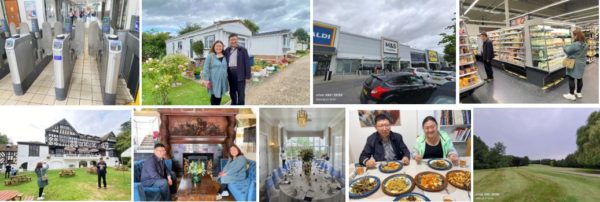
8月8-9日, 伦敦 (三)
8月8日,学术院给赵教授夫妇的安排是到博罗市场Borough Market 博罗市场。这是伦敦最古老和最著名的食品市场之一,位于伦敦桥附近的市中心。拥有超过一千年的历史,它是美食爱好者的活力中心,提供多种多样的新鲜农产品、美食和手工艺品。市场摊位出售从有机水果和蔬菜到国际美食、奶酪、肉类和烘焙食品等各种商品。博罗市场还以其热闹的氛围闻名,是当地人和游客体验伦敦美食的热门目的地(见下图)。

赵教授全家在院士之家用了两个studios:一个双人(他们夫妇)的和一个单人的(他们的儿子)。在他们回到伦敦前,学术院的工作人员在他们各自小厨房的冰箱里装满了水果、蔬菜、牛奶和矿泉水;另外,在他们外出前为每人也提供了外带的营养小吃、水果和水(下组照片左数1-3张)。

8月9日,赵教授夫妇主要是修整。他们在学术院附近转转,上组照片右数第1张照片是赵教授在微信群里分享的照片,他感到伦敦的天气挺好的。这张照片拍的是在公交车292站后面的房子。从院士之家到该公交车站仅2分钟步程,一个方向可以去他们之前去过的Borehamwood购物园,另一个方向可去Edgware地铁站。
8月10日,牛津(三)/ 伦敦(四)。
早上8点,学术院项目经理余莉女士到学术院院士之家接赵可金夫妇去牛津Radley College暑期学校接他们的儿子。之后拜访了在牛津大学经济学系访问的龙登高教授,之后参观牛津大学并交流。之后安排的是去比斯特购物中心。这个奥特莱斯购物村展示了现代零售业和服务业的成功案例,反映了全球化经济中的消费文化和商业模式。结合这两者的参观体验,可以从不同角度更全面地理解英国现代化进程及其在全球发展中的经验和影响。
晚上回到院士之家聚餐。正好南开大学前副校长、全球中国学术院院士朱光磊教授全家来访(见朱光磊教授访问英文网页)。学术院信托董事会前主席 Ingrid Cranfield 亦出席接待。Ingrid 现任环球世纪出版社社长,曾任恩菲尔德市副市长。席间大家就学术与交流事务进行了深入交谈。赵可金教授分别向常向群教授与 Cranfield社长赠送了小礼品(下组照片左数1–3)。晚宴甜品为 Ingrid 亲手采摘的苹果与黑莓制作的传统英国黑莓苹果派Blackberry and Apple Pie。晚宴结束时已是九点多,英国夏夜天色仍未完全暗下,赵教授全家与 Ingrid 及陪同其前往牛津的余莉在分别时合影留念(下排照片右数1–2)。

8月11日,温莎 /伦敦(五)。
8月11日,赵可金教授夫妇围绕“近代英国现代化及其全球发展经验研究”主题又开展了一整天的调研行程。上午,他们参观了温莎城堡Windsor Castle及温莎小镇。作为英国君主制的重要象征,温莎城堡不仅展示了英国在建筑技术、文化遗产保护与旅游业发展方面的现代化经验,也体现了君主制在公共服务与国家形象塑造中的持续作用。随后,赵教授夫妇走访了伊顿公学 Eton College。这所创立于1440年的私立学校培养了多位英国首相与世界级领导人,其教育制度与传统为理解英国精英教育与制度延续提供了重要案例(下面照片左数1-3)。
下午,他们前往伦敦的威斯敏斯特教堂,欣赏管风琴演出,从宗教、音乐与公共文化空间的角度进一步体会英国历史与现代性的融合(下面照片右数之一)。

傍晚,赵教授与伦敦经济学院LSE美国中心主任 Peter Trubowitz 教授会面,就清华大学与LSE的合作事宜进行了深入讨论,确认了8月22日会议安排的细节。随后共进晚餐,晚间乘地铁与公交返回院士之家。当天的行程从王权、教育、宗教文化到学术合作,构成了对英国现代化经验的一次系统性观察。
8月12日,伦敦(六)。
8月12日上午,赵可金教授前往维多利亚与阿尔伯特博物馆Victoria and Albert Museum(V&A)参访。作为世界领先的艺术与设计博物馆,V&A收藏了涵盖陶瓷、玻璃、纺织、时装、家具、珠宝、摄影与雕塑等门类的丰富藏品,时间跨度从古代至当代,系统呈现了不同文明与时代的设计成就。博物馆本身的维多利亚时代建筑亦展示了当时的建筑技术与审美理念。通过其策展、运营与数字化服务模式,V&A为理解英国在艺术设计领域的全球影响力及博物馆现代化治理提供了重要经验。
中午在伦敦市区用餐后,下午前往考文特花园 Covent Garden。这一由历史市场演变而来的公共空间,体现了伦敦在城市更新、商业发展与公共空间管理方面的现代化路径(见下面照片1-4)。其后,赵教授夫妇与在伦敦的朋友进行了交流。

当天上午和下午,赵教授的夫人在家休整,他们家人用的两个studios和院士之家的公用洗衣机,三台洗衣机同时启动,洗了很多衣物,感觉住在院士之家非常方便,应有尽有。
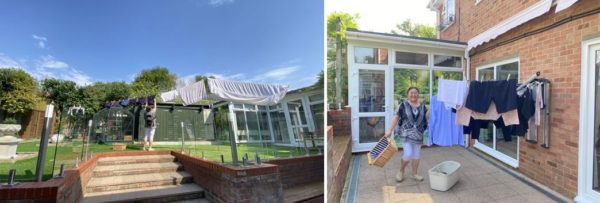
傍晚,常教授与赵夫人一起乘地铁到在皇家阿尔伯特音乐厅Royal Albert Hall与赵教授和他们的儿子汇合,一起参观了音乐厅,并音乐厅内的 Elgar Room一起享用意式晚餐。赵夫人说,在地铁上看不到英国白人,原来他们都在这里。

之后,我们一起在这里观看了 BBC 逍遥音乐会The BBC Proms 2024, Prom 32。这一创办于1895年的公共音乐制度,至今仍是英国夏季文化生活的重要组成部分。本场音乐会将现代作曲家的作品与贝多芬《第七交响曲》并置,展现了英国在公共文化体系中对传统与创新并行的长期坚持。音乐会由英国国家威尔士交响乐团演出,尼尔·文迪蒂(Nil Venditti)指挥,萨克斯管独奏为杰斯·吉勒姆(Jess Gillam),曲目涵盖格蕾丝·威廉姆斯、卡尔·詹金斯、路易丝·法伦克的现代作品,以及贝多芬A大调第七交响曲。音乐厅内相对单一的观众结构,与伦敦街头的高度多元形成鲜明对比,也提示英国文化现代化中“核心文化的稳定性”与“社会多样性的开放性”之间的张力——这种并存本身,正是英国现代化的重要特征之一。通过这一兼具传统与创新的音乐体验,赵教授夫妇进一步体会到英国在公共文化制度、艺术传播与国家文化生活中的现代化实践。
8月13日,伦敦(七)
8月13日,赵可金教授围绕“近代英国现代化及其全球发展经验研究”继续开展实地考察,并同步为即将到来的四校代表团行程做前期准备。当日主题为英国历史与文化(三),由梁凯负责接待与协调。上午,赵教授与家人从 Edgware Station 出发,经 Waterloo 换乘 South Western Railway 抵达 汉普顿宫 Hampton Court Palace。作为英国重要的王权与历史建筑遗产,汉普顿宫集中呈现了英国在建筑技术、园林设计与社会文化方面的演变,体现了皇家权力中心在英国现代化进程中的长期影响(下面组图上排照片左一)。
中午,梁凯陪同赵教授全家在汉普顿宫高尔夫俱乐部 Hampton Court Golf Club用餐(下面组图上排照片中间)。该俱乐部毗邻汉普顿宫王室园林,是一座历史悠久、环境优美的传统英式高尔夫俱乐部。球场坐落于泰晤士河畔的皇家绿地之中,融合了宫廷景观、林地与草地地貌,体现了英国将休闲运动、景观保护与公共文化空间相结合的传统。俱乐部不仅是高尔夫运动场所,也长期作为社交、交流与社区活动的空间,折射出英国绅士文化与现代休闲制度的发展脉络。
梁凯同时也是汉普顿宫高尔夫俱乐部的终身大使,是目前英国高尔夫俱乐部体系中唯一一位担任此类角色的华人。这一身份不仅体现了他个人在英国高尔夫界的长期投入与认可,也象征着华人社群在英国传统精英休闲文化中的逐步融入与可见性提升,从一个侧面反映了英国社会文化结构的开放性与演变。
下午他们参访基尤皇家植物园 Kew Gardens。该园不仅是世界领先的植物研究与教育机构,也展示了英国在科学研究、环境保护与全球知识网络中的持续影响力,为理解英国现代化中的科学制度与全球责任提供了重要案例(下面组图上排照片右一)。
傍晚,赵教授全家返回院士之家,与常教授和学术院执行经理刘大卫先生在 The Rising Sun Mill Hill 共进晚餐(下面组图下排1-4张)。Rising Sun 餐厅历史可追溯至16世纪,如今由富有创新精神的 Delnevo 兄弟经营。这家传统酒馆与餐厅,以其温馨的环境、精致的菜肴和优质的服务而闻名。菜单以意大利家族传统为灵感,并融入亚洲风味,呈现出独特而丰富的味觉层次,尤其以充满那不勒斯风情的披萨著称。这是院士之家的边走边聊的第三条路线的餐饮点。

8月14日,剑桥。
8月14日,赵可金教授继续围绕“近代英国现代化及其全球发展经验研究”开展实地考察,并为即将到来的四校代表团访问做前期衔接与铺垫。本日行程由梁凯总、林博士及孔珍妮接待。
上午首先前往剑桥以北的伊利大教堂 Ely Cathedral,这座中世纪建筑杰作展示了英国宗教、建筑技术与地方治理在现代化进程中的历史根基。伊利大主教堂里面有一个雕塑,可能是著名艺术家乔纳森·克拉克Jonathan Clarke创作的《生命之路》Way of Life 雕塑。它是以铸铝制作,顶部是一个风格化的十字架,下方是一条弯曲的道路。这是对基督徒信仰之旅的现代诠释,蜿蜒的道路象征着朝圣者通往十字架的旅程,而十字架代表着基督教信仰中精神生活的最终目标。该雕塑显眼地安装在伊利大教堂的墙上,与教堂融合历史建筑与当代艺术的理念相呼应,这件艺术品成为大教堂内宏伟哥特式内部的一处焦点,邀请人们沉思并反思它所代表的精神旅程 (下面组照片左数1-2)。
随后抵达剑桥大学菲茨威廉博物馆Fitzwilliam Museum ,创建于1816年,收藏涵盖欧洲绘画、雕塑、古典文物、亚洲艺术及手稿等,跨越数千年文明史。博物馆以其学术性与公共性并重的传统,体现了英国大学博物馆在知识保存、研究与公众教育中的重要角色,也是英国文化与学术现代化的重要组成部分。由林政升博士的接待下参观馆藏,了解英国大学博物馆体系在艺术、知识与全球文化交流中的作用。林政升博士 Dr James Lin 为剑桥大学菲茨威廉博物馆亚洲部主任,长期从事亚洲艺术史、物质文化与跨文化交流研究,尤其关注中国及东亚艺术在全球语境中的流动与再诠释。他在博物馆策展、学术研究与公共教育之间建立起紧密联系,推动亚洲藏品在英国学术体系与公众文化中的可见性,是英国博物馆界重要的亚洲艺术专家之一。陪同一起参观的还有孔珍妮 Jeni Kong,她是孔子第72代孙子孔维众Kong Weizhong的夫人,也是孔氏家族中极为罕见的西方成员。她长期生活于英国,在中英文化交流、教育与公共文化活动中积极参与相关工作,成为孔氏家族传统在当代西方社会中的一个独特延续与转文化实践案例。作为唯一的白人孔氏家族成员,她的身份本身即体现了儒家家族传统在全球语境中的开放性、流动性与再生能力,也象征着中国传统文化在跨文化、跨代际传播中的当代表达(下排照片右二中左2为林博士,右一为孔珍妮 )。
午餐在具有重要科学史意义的老牌酒馆 The Eagle 进行——DNA结构发现曾在此酝酿,体现了学术传统与公共空间的交汇。
下午,常教授与赵教授一起拜访了剑桥大学露西·卡文迪什学院院长、英国高等教育领域的重要人物——玛德琳·阿特金斯女勋爵 Dame Madeleine Atkins。她曾与2013年第八届全球中对话后接待过全球中国学术院的代表团。玛德琳曾是英国高教委员会基金会主席,现在剑桥英联邦、欧洲和国际信托基金会信托人,剑桥大学捐赠和外部法律事务委员会,大学学部委员,大学理事会成员等。她的头衔Dame,唯一的在高校工作获此殊荣的女性,相当于伦敦经济学院前校长吉登斯的Lord。我们就高等教育治理、国际合作与制度经验进行交流,也为后续代表团访问奠定基础(下排照片右一)。
傍晚行程转为轻松的城市生活考察,在Hatfield的Galleria购物中心进行观察式参访,这是一座由原飞机机库改造而成的奥特莱斯式购物中心,兼具工业遗产与现代商业特色。这里汇集了多家英国及国际品牌折扣店、餐饮与休闲设施,是当地居民与访客常去的购物与休闲空间,也体现了英国在旧工业建筑再利用与城市更新方面的现代化经验。晚餐在Real China,这是一家提供正宗中式菜肴的餐厅,以家常口味和稳定品质著称,深受当地华人和英国食客欢迎结束,这里构成院士之家边走表聊的第六条路线的一部分。

8月15日 伦敦(八)
赵可金教授围绕“近代英国现代化及其全球发展经验研究”,重点考察英国的经济金融体系、政府治理结构与信息传播体系。
上午,赵教授全家从院士之家出发,前往伦敦市中心与金融城一带,实地走访白厅及其周边的核心政府部门,包括唐宁街十号、内阁办公厅、商务和贸易部、文化媒体与体育部、教育部、能源安全与零排放部、环境食品与乡村事务部、外交联邦与发展事务部、卫生与社会福利部、内政部、住房、社区与地方政府部、司法部、交通部及财政部等。英国政府机构高度集中,空间布局紧凑,多为白色历史建筑,直观呈现了其高度制度化、低层级化的治理结构。
随后考察伦敦金融城,参观英格兰银行、伦敦证券交易所、劳合社及部分跨国企业总部所在地,并视时间前往伦敦港与东伦敦科技城(East London Tech City),观察金融、科技与城市更新之间的互动关系。中午在市区用餐。
下午,他们重点走访信息与传媒机构,先后参观位于波特兰坊的英国广播公司(BBC)新闻中心,并前往舰队街一带,了解《泰晤士报》《金融时报》《每日电讯报》《卫报》《观察家报》等英国主流媒体的历史空间与制度传统。BBC成立于1922年,是英国最重要的公共广播机构,其办公网络分布全国、运作高度灵活,伦敦总部仍是新闻与公共事务报道的核心枢纽。当日还考察了位于伦敦西区的中国环球电视网(CGTN)欧洲代表处,了解中国媒体在海外发展的路径及其与英国媒体生态的差异与互动。
以下是他们在微信群分享的部分照片。

8月16日 伦敦(九)
8月16日,考察主题聚焦英国经济金融体系与伦敦作为全球城市(Global City)的大都市治理结构。赵可金教授围绕“近代英国现代化及其全球发展经验研究”,上午前往伦敦金融城(City of London),实地考察英格兰银行(Bank of England)、伦敦证券交易所(London Stock Exchange)以及部分跨国企业总部所在地,并参观英格兰银行博物馆(Bank of England Museum),系统了解英国中央银行制度的历史演化与金融治理传统。支撑金融城运行的另一重要机构是英国皇家交易所(Royal Exchange),其空间与制度形态反映了伦敦金融体系的历史连续性。
随后考察伦敦大区新建的市政厅(City Hall),了解伦敦在区域治理、公共服务协调与国际城市治理中的制度设计与实践经验。上午还参观了白厅(Whitehall)及唐宁街10号(10 Downing Street)一带,考察伦敦议会(London Assembly)及相关政府机构的集中布局,理解伦敦作为国家政治中枢与国际都市的双重角色。
下午继续走访伦敦警察厅(Metropolitan Police Service)、伦敦消防队(London Fire Brigade)、国民保健署信托伦敦救护服务(London Ambulance Service NHS Trust)及伦敦港务局(Port of London Authority)等关键城市运行机构,从公共安全、应急治理、公共卫生与港口管理等方面,系统观察超大城市日常治理的制度结构与运行逻辑。
赵教授在微信群里做了大量的文字分享,以下照片为网上下载。

8月17日 伦敦(十)
当日,赵可金教授一行主要进行修整,并集中筹备清华大学及京沪四校代表团在英期间的接待与活动安排。此次接待对全球中国学术院具有特殊意义——这是学术院首次以整体策划、全流程组织的方式,系统接待并陪同国内高校学者在英国开展实地考察与学术交流活动。相关安排既是对前期考察工作的延续,也标志着学术院在跨国学术支持与组织能力上的一次重要实践。
在代表团抵达前,赵可金教授夫妇主动提出,希望其子参与部分接待工作,作为一次实际的社会参与与责任训练。全球中国学术院予以接受,并将其纳入志愿服务安排。父子合作的第一项任务,便是协调与学术院统一调度的车辆前往机场接机。代表团共7人,携带7件行李,乘坐CA937航班,于当日16:00–17:00之间抵达伦敦希思罗机场第二航站楼(London Heathrow T2),然后分别送往预定的酒店及学术院院士之家。
当晚,全球中国学术院在院士之家举办了欢迎聚会。自此,赵教授全家全程参与学术院为代表团安排的各项活动,与学术院团队、志愿人员共同推进代表团行程的顺利开展。随后,工作微信群正式更名为“四年六高校英国破冰之旅”,以纪念2020—2024年新冠疫情阻断的四年线下交流,以及此次共同参与的六所高校——除清华大学组织的京沪四校外(中国人民大学、首都对外经济贸易大学、复旦大学),还包括南开大学(朱光磊教授全家)与东北师范大学(张淑燕教授母女)等成员。
在整个行程中,赵可金教授持续在微信群中分享其考察体会;而全球中国学术院也首次将国内学者在英国开展系统性考察的全过程加以记录,并整理成此篇博文,以公开、透明的方式呈现学术交流背后的组织工作与跨文化协作过程。谨以赵可金教授在上述微信群中的致谢语作为全文结尾:“感谢清华的慷慨资助,感谢全球中国学术院的精心接待,感谢家人的亲情陪伴,感谢一路上无数朋友的无私帮助。面对未来,吾将风雨兼程!”
注释:
- 2023年11月,马丁·阿尔布劳教授到北京参加国际会议并在清华、人大等高校演讲,李强教授因新冠病毒感染已经住院抢救。
- 感谢非常感谢全球中国学术院邀请的志愿人员接力棒式的接应和陪同!他们是UCL博士生程语桐(牛津),英国大道教育咨询集团总裁、伯明翰华埠商会执行主席王澍斌王总及伯大的几位博士(伯明翰),《英国社会学评论》期刊的博士后研究员胡正栋博士(曼彻斯特),中非桥执行总裁、英中科创(创始)会长周霄飞博士和格拉斯哥大学研究生南宇航(格拉斯哥),很高兴大家都认为这段经历对各自也是有益的。感谢全球中国学术院理事会主席Tony McEnery教授,信托董事会主席叶玛丽Maria Jaschok教授、院长常向群教授、信托董事会前主席Ingrid Cranfield、学术院执行经理刘大全、活动官员梁凯、项目经理于莉在伦敦、牛津、剑桥的帮助,还有格拉斯哥大学的杜珍Jane Duckett 教授、剑桥大学玛德琳·阿特金斯女勋爵教授Dame Madeleine Atkins、林政升James Lin博士和孔珍妮Jeni Kong女士。
- 我们在向志愿人员分配工作前交代,要确保从车站到酒店和酒店回车站的顺利通畅,并且报销送往迎来的车费。各种参观景点是否陪同取决于彼此的时间和兴趣。
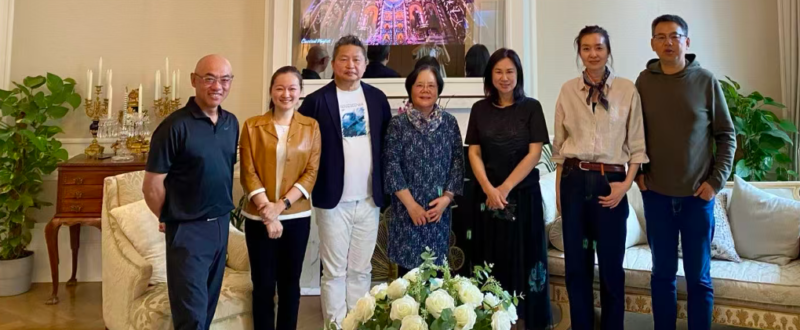
在空间之间理解社会使命:全球中国学术院2024年团队建设活动纪实
全球中国学术院(Global China Academy, GCA)自成立以来,始终坚持学术使命与社会使命并行的双重定位。如果说学术使命更多体现在研究、出版与对话平台的建设上,那么社会使命则更依赖于人、空间、经验与行动的结合。2024年4月与7月,GCA 团队通过两次有意识设计的团队活动,逐步形成了一套关于“如何在当代社会履行社会使命”的实践理解框架。
这两次活动并非传统意义上的团建,而是以空间为媒介、以体验为方法、以讨论为核心的集体思考过程。它们分别发生在伦敦不同的城市空间中,从新古典到后现代,从历史花园到垂直城市生活,从可见秩序到隐秘治理,构成了一条完整的“社会使命认知路径”。
一、7月15日:在新古典与后现代空间之间思考社会使命
1. Park Crescent:新古典秩序中的公共生活
7月15日,GCA 团队在伦敦市中心的 Park Crescent 开始了一天的活动。Park Crescent 由约翰·纳什(John Nash)于19世纪设计,是伦敦最具代表性的新古典城市空间之一:弧形建筑环绕花园,秩序、对称与比例构成了城市公共生活的理想形式。
上午,团队在一位同事家中品茶、交流,讨论学术院近期的工作与挑战。这个空间本身就是一种象征:新古典建筑并不只是审美形式,而是把公共性、节制与责任写入空间结构之中。团队围绕“学术机构如何在当代社会继续发挥公共作用”展开讨论,也正是在这样的空间氛围中,讨论自然地指向了社会使命的问题。
2. Nursemaids’ Tunnel:被隐藏的社会治理空间
在花园行走之后,团队进入了位于 Park Crescent 花园内部的 Nursemaids’ Tunnel(保姆隧道)。这条建于19世纪的地下通道,曾用于连接住宅、花园与周边街区,使照护者和服务人员可以在不打扰公共秩序的情况下完成日常工作。
这是一处极具象征意义的空间:地面之上是优雅、可见的公共秩序,地面之下则是支撑城市运行的隐秘劳动与治理结构。
当团队从明亮的花园进入光线收缩、回声回荡的隧道时,空间本身完成了一次社会学意义上的“教学”。大家意识到,社会使命并不只存在于宏大的理念与制度中,而是存在于这些被忽略的连接、通道和责任之中。学术机构若要真正履行社会使命,必须看见并理解这些“不可见的社会基础设施”。
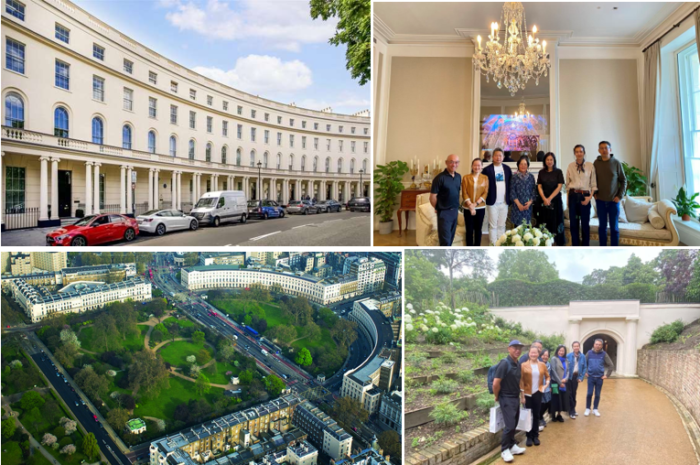
3. Landmark Pinnacle:后现代垂直城市的生活系统
下午,团队从伦敦西区来到金丝雀码头的 Landmark Pinnacle。与 Park Crescent 形成鲜明对比,这里代表的是后现代城市的垂直生活方式:居民共享设施、高度系统化的管理、可预约的公共空间、跨文化混合的生活场景。
团队体验了楼内的公共空间、屋顶花园、活动设施与公共厨房,并在高空俯瞰泰晤士河。这里呈现的是另一种社会治理模式——制度化、平台化、技术化,但同时也更依赖个体的自觉参与。
正是在新古典与后现代空间的强烈对比中,团队逐渐形成共识:学术机构的社会使命,正是要在不同社会结构之间建立理解、对话与连接能力。
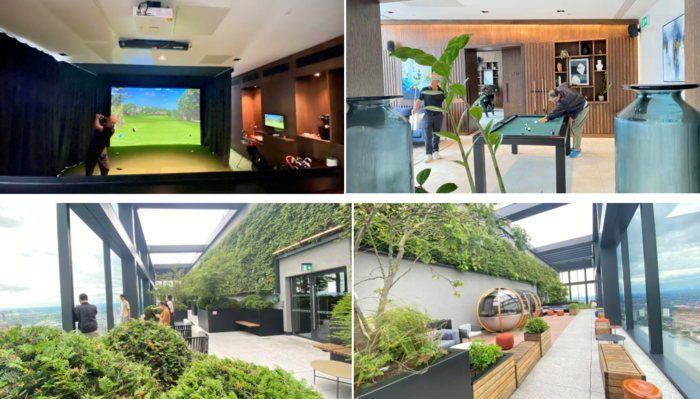
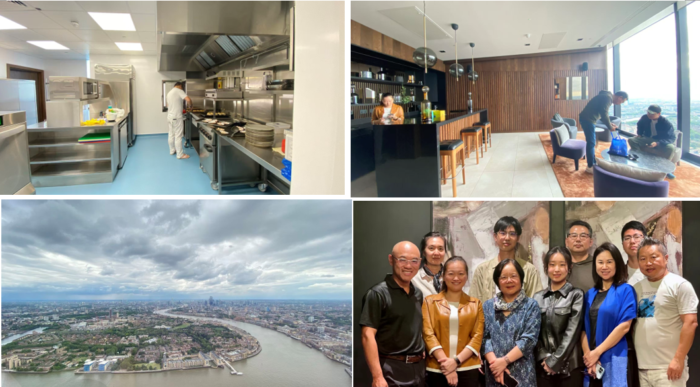
二、4月27日:在历史、自然与行走中形成“行动中的讨论”
如果说7月的活动是一次空间维度上的对照学习,那么4月的活动则是一次行动中的讨论实践。
4月27日,GCA 团队在 GCA Fellows’ Home(院士之家) 集合,上午在轻松的环境中品茶、讨论工作安排,随后前往 Mill Hill Golf Club。高尔夫作为一种强调节奏、判断与自我约束的运动,也自然成为团队交流的一种方式。
下午,团队前往 Brocket Hall——一处典型的新古典庄园,曾是英国政治、外交与公共生活的重要场所。团队在庄园中行走、交流,并在晚间前往 Hatfield 的 Real China Restaurant 共进晚餐。
正是在这次活动中,GCA 正式形成了第六条“Walk and Talk(行走与讨论)”路线:把讨论从会议室带入自然、历史与社会空间中。
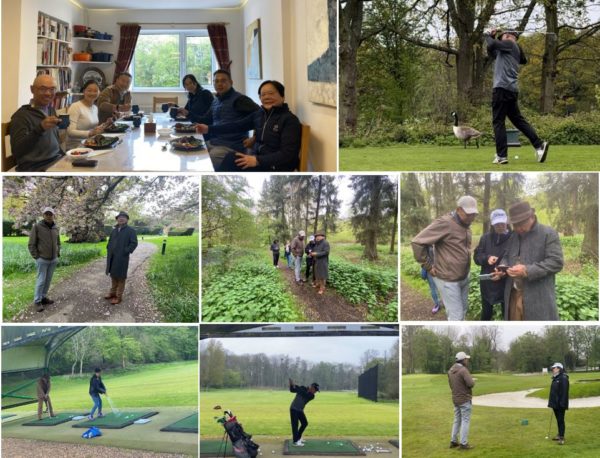
三、从活动到框架:社会使命如何被“实践出来”
这两次团队活动,逐步让GCA形成了对社会使命的一个更清晰理解框架:
- 社会使命不是附属,而是学术使命的延展
- 空间本身可以成为理解社会治理的工具
- 跨文化对话不仅发生在会议中,也发生在共同经验里
- 年轻学者、未来领导者需要在真实场景中学习公共责任
因此,GCA 将社会使命具体落实为以下方向:
- 通过 全球中国对话(GCDs) 搭建跨学科、跨部门、跨国家的交流平台
- 通过 领导力培训与社会实践 培养年轻政治与商业领袖的公共意识
- 通过 跨文化研究与出版 推动知识向公共领域转化
- 通过 空间化、行动化的团队与社群活动,让学术真正进入社会
结语:在空间中学习,在行动中承担
从 Park Crescent 的新古典花园,到地下的 Nursemaids’ Tunnel,再到 Landmark Pinnacle 的高空公共空间;从 Brocket Hall 的历史庄园到行走中的讨论——2024年的两次团队活动,让 GCA 团队更加确信:社会使命不是一个口号,而是一种需要被不断体验、讨论与实践的能力。
全球中国学术院将继续通过这样的方式,把学术、社会、空间与人连接起来,推动一种更具责任感、理解力与行动力的全球社会参与模式。
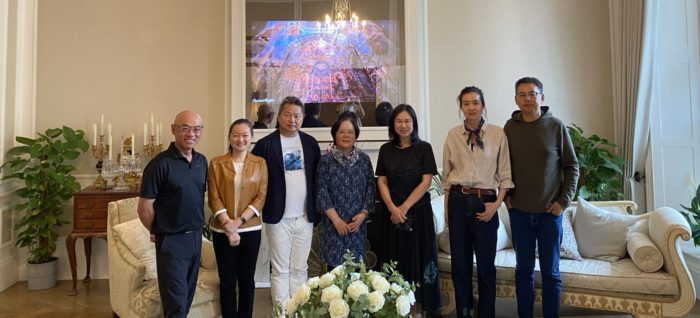
Understanding Social Mission Through Space: GCA Team-Building Activities in 2024
Since its founding, the Global China Academy (GCA) has upheld a dual commitment to academic excellence and social mission. While the academic mission is primarily realised through research, publications, and dialogue platforms, the social mission requires something more experiential: the integration of people, space, lived experience, and collective reflection.
In April and July 2024, the GCA team organised two carefully designed team-building activities in London. These were not conventional retreats, but learning journeys through space, using architecture, movement, and shared experience as methods to reflect on how an academic institution can fulfil its social responsibilities in contemporary society.
Together, the two events formed a coherent pathway—from neoclassical urban order to postmodern vertical living, from visible public space to hidden infrastructures of care—through which the GCA team collectively articulated a renewed understanding of its social mission.
I. 15 July 2024: Reflecting on Social Mission Between Neoclassical and Postmodern Spaces
1. Park Crescent: Public Life and Neoclassical Order
The July team activity began at Park Crescent, one of London’s most iconic neoclassical urban designs, created by John Nash in the early 19th century. The elegant curved terraces surrounding a central garden express an ideal of public life based on order, proportion, restraint, and responsibility.
Gathering at a colleague’s home, the team shared tea and discussed ongoing work and institutional challenges. The space itself shaped the discussion: neoclassical architecture is not merely aesthetic—it encodes a vision of civic duty and collective life. Conversations naturally turned to the question of how GCA can continue to serve society beyond academic production.
2. Nursemaids’ Tunnel: The Hidden Infrastructure of Social Governance
From the garden, the team entered the historic Nursemaids’ Tunnel, located beneath Park Crescent. Built in the 19th century, the tunnel allowed caregivers and service workers to move discreetly between homes and gardens without disturbing the visible order of elite residential life.
The tunnel offered a powerful spatial metaphor.
Above ground lies elegance and visibility; below ground lies the hidden labour and governance that sustains society.
Walking through the narrowing, echoing passage, the team experienced a moment of collective realisation: social responsibility is often embedded in invisible systems, connections, and acts of care.
For an academic institution to fulfil its social mission, it must learn to recognise and engage with these unseen foundations of social life.

3. Landmark Pinnacle, Canary Wharf: Postmodern Vertical Living and Platform Governance
In the afternoon, the team travelled to Landmark Pinnacle in Canary Wharf, London’s tallest residential tower and a symbol of postmodern urban living. Here, shared amenities, bookable facilities, and digitally managed spaces define a highly systematised form of community life.
Exploring the communal areas, rooftop gardens, and shared facilities, the team reflected on a different model of social governance—platform-based, technology-mediated, and participation-dependent. From the upper floors, overlooking the Thames, the contrast with Park Crescent could not have been sharper.
This spatial juxtaposition clarified a central insight: the social mission of an academic institution today lies in building understanding and dialogue across different forms of social organisation.


II. 27 April 2024: Learning Through Movement, Nature, and Shared Experience
If the July activity focused on spatial contrasts, the April activity emphasised thinking through movement and collective practice.
The day began at the GCA Fellows’ Home, where team members gathered for tea and discussion, followed by a visit to Mill Hill Golf Club. The rhythm of the game—balancing judgment, patience, and discipline—created a relaxed yet focused environment for exchange.
In the afternoon, the team visited Brocket Hall, a neoclassical estate deeply embedded in British political and cultural history. Walking together through the grounds, conversation flowed naturally. Dinner later that evening at the Real China Restaurant in Hatfield completed the day.
This occasion formally established GCA’s sixth “Walk and Talk” route—a method of embedding dialogue within landscape, history, and shared movement.

III. From Activities to Framework: How Social Mission Is Practised
Through these two events, GCA gradually articulated a clearer framework for its social mission:
- Social mission is not an add-on but an extension of academic purpose
- Space can serve as a pedagogical tool for understanding governance
- Transcultural dialogue emerges not only in meetings but in shared experience
- Future leaders must learn public responsibility in real social settings
Building on this understanding, GCA advances its social mission through:
- The Global China Dialogues (GCDs) as platforms for cross-sectoral exchange
- Leadership training and social engagement programmes for young political and business leaders
- Transcultural research and publishing that translate knowledge into public impact
- Experiential, space-based collective activities that bring academia into society
Conclusion: Learning Through Space, Acting Through Responsibility
From the neoclassical gardens of Park Crescent to the hidden passageways of Nursemaids’ Tunnel, from the vertical communities of Canary Wharf to the historic landscapes of Brocket Hall, the GCA team’s 2024 activities reaffirmed a shared conviction: Social mission is not a slogan, but a capacity that must be continually experienced, discussed, and practised.
The Global China Academy will continue to build bridges between scholarship, society, space, and people—advancing a form of global engagement grounded in responsibility, understanding, and collective action.
Participants in the activities in the top photo from left to right: Kai Liang (Event Officer), Katie Zheng (Administrative Manager), Alan Fang (Legal Adviser), Yu Li (Project Manager), David Liu (Logistics Manager), and Xiangqun Chang (President).
- Click here to view Understanding Social Mission Through Space: GCA Team-Building Activities in 2024 in Chinese
- Click here to view GCA’s Two-Day Team Building: Blending Academic Insight with Cultural, Historic and Nature Discovery
- Click here to view Professor Maria Jaschok FGCA has been elected as Chair of the Global China Academy Board of Trustees.
- Click here to visit the GCA news & blog section.
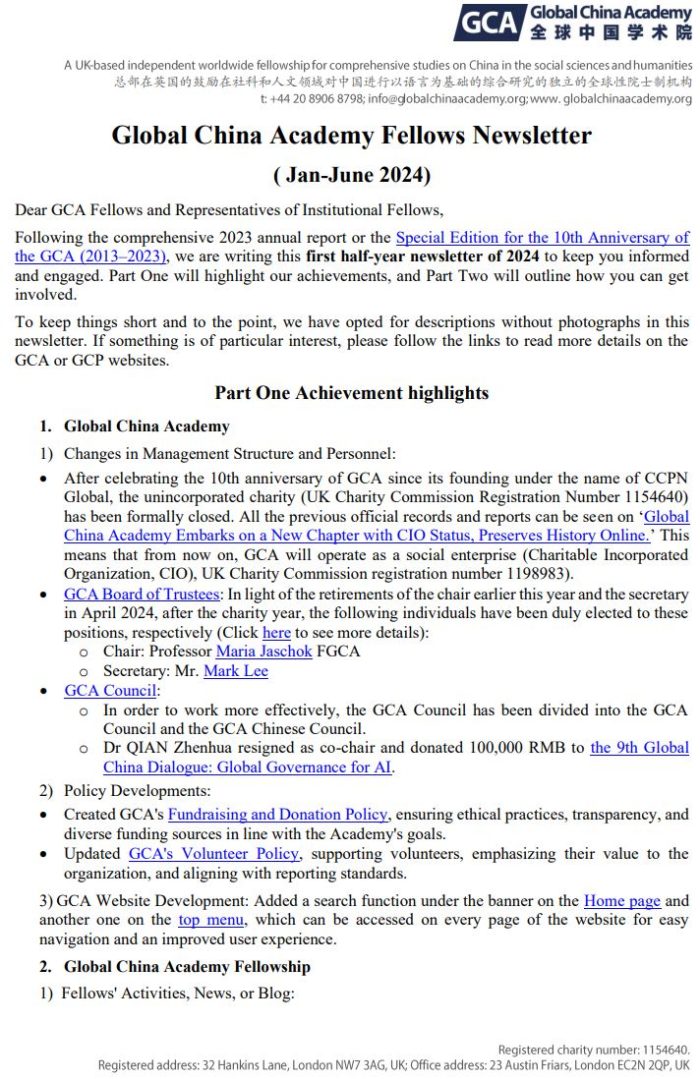
Global China Academy Fellows Newsletter (Jan-June 2024)
Dear GCA Fellows and Representatives of Institutional Fellows,
Following the comprehensive 2023 annual report or the Special Edition for the 10th Anniversary of the GCA (2013–2023), we are writing this first half-year newsletter of 2024 to keep you informed and engaged. Part One will highlight our achievements, and Part Two will outline how you can get involved.
To keep things short and to the point, we have opted for descriptions without photographs in this newsletter. If something is of particular interest, please follow the links to read more details on the GCA or GCP websites.
Part One Achievement highlights
- Global China Academy
1) Changes in Management Structure and Personnel:
- After celebrating the 10th anniversary of GCA since its founding under the name of CCPN Global, the unincorporated charity (UK Charity Commission Registration Number 1154640) has been formally closed. All the previous official records and reports can be seen on ‘Global China Academy Embarks on a New Chapter with CIO Status, Preserves History Online.’ This means that from now on, GCA will operate as a social enterprise (Charitable Incorporated Organization, CIO), UK Charity Commission registration number 1198983).
- GCA Board of Trustees: In light of the retirements of the chair earlier this year and the secretary in April 2024, after the charity year, the following individuals have been duly elected to these positions, respectively (Click here to see more details): Chair: Professor Maria Jaschok FGCA; Secretary: Mr. Mark Lee
- GCA Council: In order to work more effectively, the GCA Council has been divided into the GCA Council and the GCA Chinese Council. Dr QIAN Zhenhua resigned as co-chair and donated 100,000 RMB to the 9th Global China Dialogue: Global Governance for AI.
2) Policy Developments:
- Created GCA’s Fundraising and Donation Policy, ensuring ethical practices, transparency, and diverse funding sources in line with the Academy’s goals.
- Updated GCA’s Volunteer Policy, supporting volunteers, emphasizing their value to the organization, and aligning with reporting standards.
3) GCA Website Development: Added a search function under the banner on the Home page and another one on the top menu, which can be accessed on every page of the website for easy navigation and an improved user experience.
2. Global China Academy Fellowship
1) Fellows’ Activities, News, or Blog:
- In order to better engage GCA Fellows, it has been decided to send two GCA Newsletters each year starting from 2024.
- We also posted some of our Fellows’ activities on GCA website (in reverse order), e.g.:
- Global China Academy Board of Trustees Chair Participates in the 11th WWUPF in Zhengzhou, China, May 25-29
- The President of Global China Academy, Professor Xiangqun Chang, visited GCA Fellows at the University of Oxford in April (Click here to find related contents).
- Global China Academy Council Chair, Professor Tony McEnery’s Academic Activities in Hong Kong and China, from March to April
- We have issued invitations to some GCA Fellows and Fellow-related academics in China to visit the UK from July to August. They will stay in our Fellows’ Home during their time in London, such as:
- Professor ZHU Guanglei FGCA and his family. He is the former Vice-President of Nankai University, China, and a keynote speaker of the 5th Global China Dialogue.
- Professor ZHAO Kejin and his family. He is the Deputy Dean of the School of Social Sciences and the Director of Global Industry at Tsinghua University. He made closing remarks at the 6th and 7th Global China Dialogues in person and online respectively.
- Professor WANG Tianfu, Dean of the School of Social Sciences at Tsinghua University, who will lead a delegation from four universities in China, including Tsinghua, Renmin, and Fudan.
2) Fellowship:
- HMRC listed GCA among its ‘approved learned societies and professional organisations’ to facilitate GCA Fellowship subscriptions.
- To maintain the highest standards of GCA Fellows, no more than eight fellowships will be awarded per annum, including Full Fellows, Associate Fellows, and Institutional Fellows. This policy will be reviewed accordingly (Click here to see Fellows awarded in 2023).
- Updated the process and timetable of Guidance for Nomination (see p. 5).
- Updated Fellowship Benefits and Obligations:
- Added benefit number 1 ‘Global promotion of the academic publications and activities of GCA Fellows’.
- Added a tailor-made package service for different types of GCA Fellows-related delegations (see a 7-day package as an example).
- Added the sixth ‘walk and talk’ route, including tea and lunch, at and around the GCA Fellows’ Home.
- The GCA Fellows award ceremony in 2024 will take place at the GCD9 at Tongji University. GCA will cover the cost for those who wish to receive their awards in Shanghai, China.
3. Global Century Press
1) Activities:
- Originally initiated for the Journal of Chinese for Social Science (JCSS), the 2nd China-Focus Research Forum was held both offline and online at the GCA Centre on June 8, 2024.
- GCP colleagues participated in numerous events at the London Book Fair (LBF) from March 12-14 and engaged with professionals and authors during the events (click here for more details).
2) Regulations and Policy:
- GCP became a member of The Association of Learned and Professional Society Publishers (ALPSP).
- Updated the Open Access Policy, clarifying different types of ‘processing charges,’ including those for journals and journal articles, books, and book chapters.
- Published a new edition of the Global Century Press House Style Guide, which includes revised descriptions of each journal and book series and our unique ‘Dual Language Information’ section.
3) Standardization Process:
- GCP began its process of standardisation across its publications.
- Some journals and books are now available on an open access basis on the GCP website, and DOIs have been submitted to Crossref, e.g., https://globalcenturypress.com/product-category/journals-periodicals/Journal-China-Global-Comparative-Perspectives.
- This process will continue through 2024.
4. The 9th Global China Dialogue
- The Ministry of Education of China has approved Tongji University’s application for GCA to be a co-organiser of the 9th Global China Dialogue (GCD9) at Tongji University, Shanghai, on November 29th, 2024.
- It has been agreed that the GCD series will be held on the last Friday in November each year, alternating between China and the UK.
Part Two GCD Fellows’ involvements
GCA Fellows constitute the driving force behind GCA, leveraging its publications and dialogue forums as two platforms for dual successes. We invite you to get involved with GCA in the following ways:
- Send us information about your academic activities for the News & Blog section of the GCA website.
- Nominate different types of GCA Fellows. See: Fellowship nominations and to learn more.
- Contribute to GCA publications in various forms. Learn more.
- Participate in or recommend speakers for the GCD9. Learn more.
- Make any suggestions: info@globalchinaacademy.org.
As we look forward to the second half of the year, we are excited about the numerous opportunities and collaborations that lie ahead. We encourage all GCA Fellows to remain actively involved, share your academic pursuits, and contribute to our endeavours. Your engagement and participation are crucial to our continued success and the advancement of our shared goals.
Thank you for your dedication and support. Together, we will continue to make significant strides in our academic and social missions.
Warm regards,
Professor Xiangqun Chang 常向群FRSA FGCA
President of Global China Academy
Honorary Professor of University College London (2015-20)
Distinguished Professor of Nankai University
Professor Peter Schröder FRFAB FGCA
Vice President for Fellowship, Global China Academy
Professor of the History of Political Thought at Faculty of Social & Historical Sciences, UCL
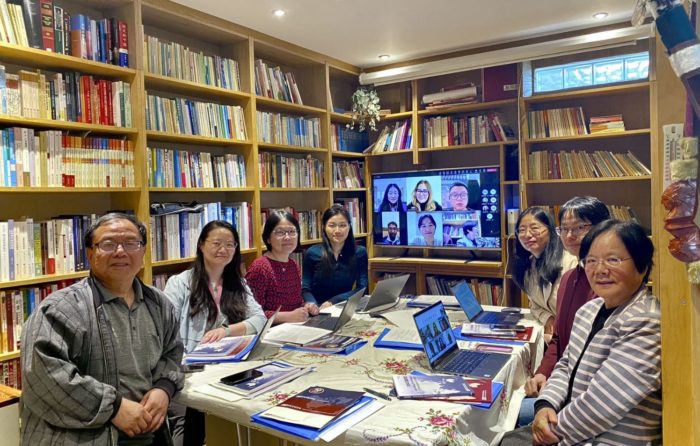
GCA Supports London’s 2nd China-Focus Research Forum (8 June 2024)
Following the 1st China-Focus Research Forum held on May 11th, 2023 (click here to find related news and photos), at SOAS, University of London, organized jointly by the student societies with support from the language teaching staff of SOAS, LSE, and King’s College London, the 2nd China-Focus Research Forum was held at the Global China Academy Centre both offline and online on June 8th, 2024.
Programme
Date and Time: 8th June 2024, 1-5 pm BST
Location: Global China Academy
Chair: Zhonghan Lin, PhD candidate in the School of Education, Communication & Society at King’s College London
1:00 – 1:10 pm Opening speech & warming up
1:10 – 1:35 pm
‘The Future of China’s Global Influence: A Theoretical Analysis of Peaceful and Conflictual Trajectories’
by Subham Kumar Kanu, The Maharaja Sayajirao University of Baroda, Vadodara, Gujarat, India
1:35 – 2:00 pm
‘The Baby-Eating Barbarians: Imagining and Constructing Chinese Images of Europeans in Late Ming and Early Qing Period’
by CHAN Pui To, Jack, The University of Hong Kong
2:00 – 2:25 pm
‘Cultural Conflict, Agency, and Muslim Hui Women’s Trajectories in Chinese State-Run Education’
by Gao Beibei, King’s College London
2:25 – 2:35 pm Special addresses:
- Professor Xiangqun Chang, President of the Global China Academy (GCA)
- Associate Professor XU Haiyan, Nanchang University; Editor of Journal of Chinese for Social Sciences (JCSS)
2:35 – 3:00 pm Break
3:00 – 3:25 pm
‘Geopolitics of Technology and China’s Ascendancy in Militarizing AI and its Implication in the Indo-Pacific: A Comparative Study of India-China in the Field of Militarization of AI’
by Agniva Ray, Jadavpur University, India
3:30 – 3:55 pm
‘Navigating the Waves: China’s Lawfare in Maritime Domain’
by Vibha Ghaty Sreesh, Rashtriya Raksha University, India
3:55 – 4:20 pm Break
4:20 – 4:45 pm
‘China’s Approach to Dispute Resolution: Are the International Commercial Courts of China (CICC) Part of China’s ‘Grand Strategy’ to Challenge the Current Structure of International Arbitration Regulations and Institutions?’
by Maria Anna Sampson, King’s College London
4:45 – 5:00 pm Closing remarks
by Dr. Hongfen Zhou, Team Leader for East Asian and South Asian Languages at the Language Centre, King’s College London
Related photos
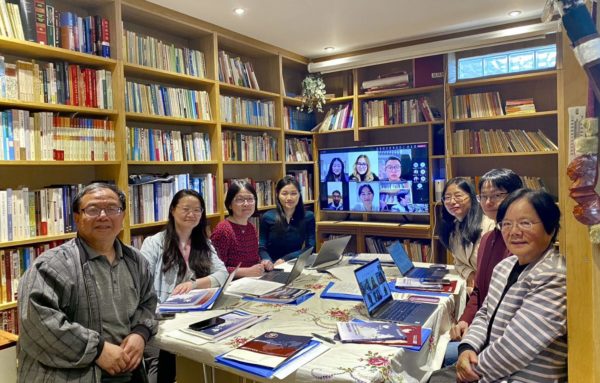
The offline venue was at the Global China Academy Centre. From left to right: Dr. Lianyi Song (SOAS), Dr. Jing Chu (KCL), Dr. Hongfeng Zhou (KCL), Zhonghan Lin (Chair, KCL), Associate Professor Xu Haiyan (Nanchang University, China), Dr. Lijing Shi (LSE), and Professor Xiangqun Chang.

Some presenters. From left to right: Subham Kumar Kanu, CHAN Jack Pui To, Gao Beibei, Agniva Ray, Vibha Ghaty Sreesh, Maria Anna Sampson, Chunjin Li.

Selected presentations. The significant features of this Forum are the global participation including three from India and broader themes compared to the 1st Forum, where the participants were primarily based in London and from SOAS.
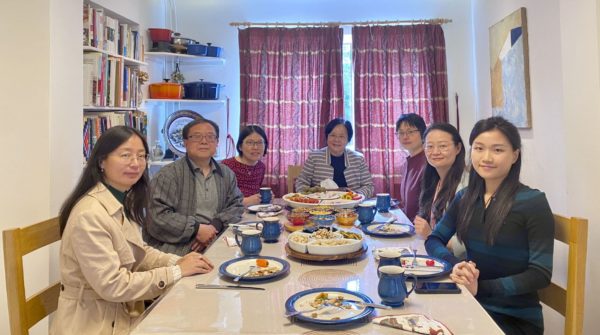
Tea break: Participants enjoyed Zongzi dumplings as June 10th, 2024, closed to the Dragon Boat Festival.
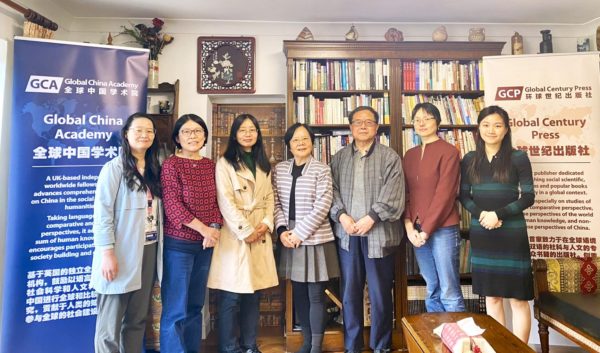
The participants were primarily the Editorial Board members of JCSS. They discussed issues related to the journal.
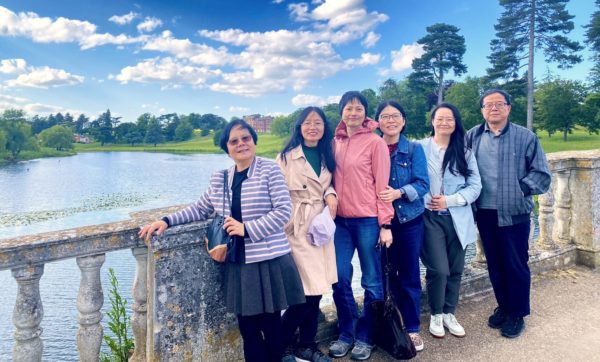
After the forum, participants visited Brocket Hall and enjoyed a walk and dinner there.
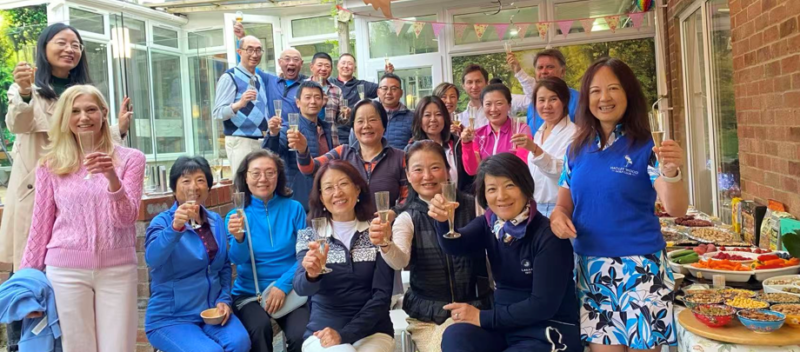
Advancing the Social Mission through Public Engagement and Community Building
In June 2024, the Global China Academy continued to advance its social mission by engaging in and organising activities that foster cultural exchange, community building, and public good across diverse social settings.
21st June, Professor Chang Xiangqun, President of the Global China Academy, and Ms YU Li, Project Manager, were invited to attend the 6th Anniversary Champagne Reception and the 20th Anniversary Charity Antique Auction of Mother’s Bridge of Love (MBL) hosted by the Chinese Collectors Club (UK). The event took place at the Whisky Club, 1A Bond Street. After a splendid pipa solo performance by the renowned artist CHENG Yu, the charity auction was hosted by Mr. Zhang Pu, Chairman of the Chinese Collectors Club (UK). All proceeds, amounting to £13,000, were donated to Mother’s Bridge of Love to express gratefulness to the MBL for funding the establishment of 28 children’s libraries in rural and urban areas of China and providing cultural consultations and support for families in 27 countries that have adopted Chinese orphans, helping Chinese orphans.
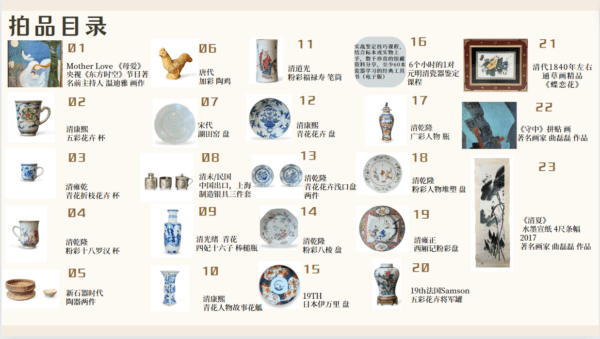
Auction Catalog.
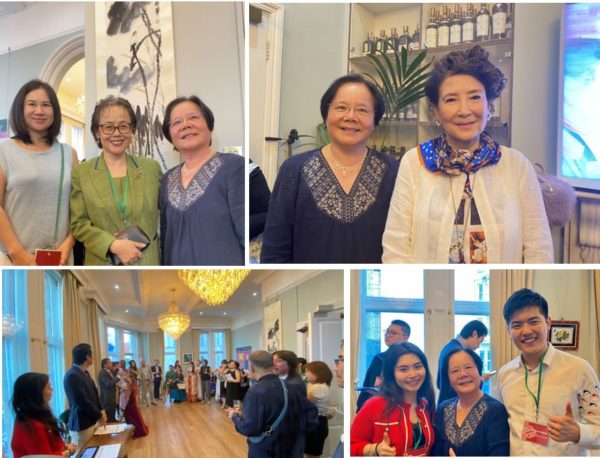
Top left: Xiangqun Chang and Yu Li with Xinran (middle), the founder of MBL. She was one of the panelists at the 1st Global China Dialogue in 2014. Top right: Xiangqun Chang with Jung Chang, author of Wild Swans (1991), Mao: The Unknown Story (2005), and Empress Dowager Cixi (2013). Bottom left: Pu Zhang hosted the auction. Bottom right: Xiangqun Chang met Fellows of The Sociological Review, Dr. William Zhengdong Hu and his wife, who were volunteers there.
On 9th June, with the help of Mr. Kai Liang, Ambassador of Hampton Court Golf Club and Event Officer of GCA, we organized 9 pairs teams to participate in the Mill Hill Mixed Open. Some of them won 1st, 2nd, 4th, 5th, and 6th places, as well as the longest drive. After dinner and prize giving, a Champagne Reception was held at the GCA Centre. The successful event served multiple purposes: mixing Chinese and non-Chinese players, celebrating Tao Liu’s Albatross (three strokes under par on a single hole), and the Chinese Dragon Boat Festival.
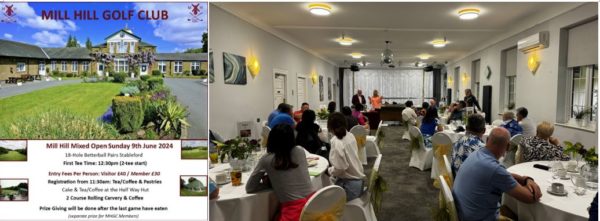
Mill Hill Mixed Open and its dinner and prize giving.
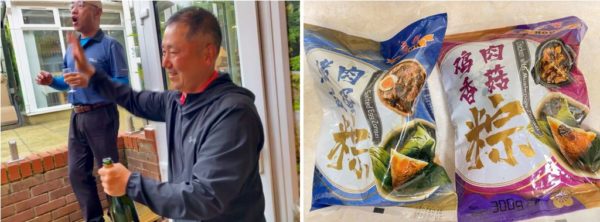
Left: Kai Liang hosted the Champagne Reception and Tao Liu opened a bottle of Champagne. Right: different varieties of Zongzi dumplings.

Everyone enjoyed the drinks, soft fruit and snacks.
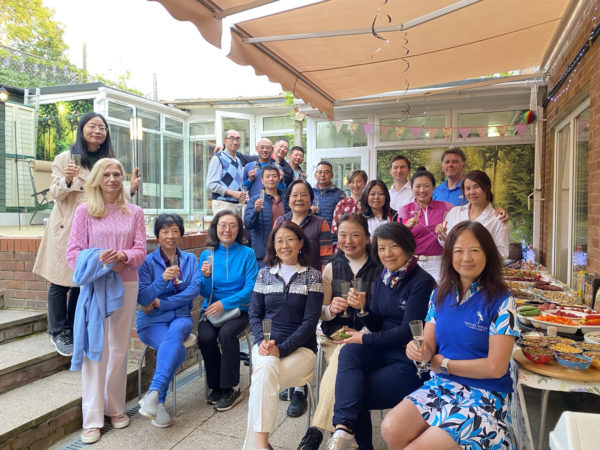
Cheers to Tao Liu and to our gathering!

The event lasted until midnight. It was a wonderful celebration of camaraderie and cultural exchange. We look forward to more successful events in the future, bringing together diverse communities in celebration and fellowship.

